|
The Shock of Surrender
Elyakim Ha’etzni
This paper was published
as ACPR Policy Paper No. 165 (Hebrew)
and ACPR Policy Paper No. 167 (English)
and is available in booklet form through the ACPR office.
Contact us for ordering information.
|
Author’s Note:
This booklet was first published in January 1986 in opposition to
Shimon Peres’ “peace” plan. Twenty years have passed, and we have
already experienced the first exile from modern day Israel.
Twenty-five Jewish settlements were handed over to the enemy, and the
intellectual, psychological, and physical infrastructure for
destroying the rest of the Jewish settlement enterprise in Judea and
Samaria was laid.
In
the next phase comes the “cleansing” of the Judean-Samarian mountain
ridge and the exile of about 100,000 Jews in order to make way, in the
language of the “Road Map,” for a “Palestinian state with temporary
borders.” This time, it is not the Biblical Rehoboam who is splitting
the nation and the kingdom, but latter-day dividers: Ariel Sharon and
now Ehud Olmert. However, the one who has always pulled the strings
was and remains Shimon Peres.
Although subsequent developments have not dated this work, a new
edition was necessary since copies of the original edition are no
longer available. I have taken that opportunity to make whatever
additions the passage of two decades required. Unfortunately, some of
the events foreseen have already transpired, the most tragic being the
beginning of the abandonment of the Land of Israel, accompanied by a
dangerous split in the nation.
This edition is being published in “real time”, a time when the
expulsion plans for all the Jews living on the wrong side of the
“separation fence” have been readied. I can only hope that this
booklet will make some small contribution towards stopping the
headlong rush towards a very bitter destiny, one that throughout our
history causes us to destroy with our own hands that which we know how
to build with such tremendous self-sacrifice, talent, sweat, and
tears.
Elyakim
Haetzni
Nisan 5766, April
2006 |
|
The author wishes to express
his special gratitude to the English translator, Timna Katz, thanks to
whose comments the English edition contains important improvements. |
Chapter 1:
The Spiritual Shock
of Surrender
In the long period since the historic
Land of Israel was liberated in the Six Day War, we have become accustomed
to the profusion of plans, proposals, and demands for Israel to withdraw
from Judea, Samaria, Gaza, and biblical Jerusalem, and to hand these areas
over to the Arabs.
It is truly amazing that during the
course of this 40-year national “symposium” on withdrawal that has caught up
the entire nation, so little attention has been paid to the existential
meaning and ramifications of such a move. We refer to the implication of
even considering a public and juridical surrender, by way of an
international document, of the places and sites that have aroused our
yearning and prayers during our entire existence as a nation.
We haven’t heard anyone say, for
example, that just as the Zionist movement was ignited by Herzl’s demand
that a Jewish state arise by way of a public-juridical decision, it would
mark the end of this very same Zionism were a Jewish state in the Land of
Israel to surrender Zion to strangers in a similar public-juridical act.
The emphasis is on the free and
voluntary nature of the surrender, as distinct from the compulsion of war or
other forms of duress that caused the Jewish people to be exiled from their
land after the destruction of the First and Second Temples and the fall of
Beitar. Was it not, in fact, Zionism that showed the world that external
compulsion could not succeed in extinguishing the spark of hope and yearning
for Zion that burned during the dark millennia of waiting in exile? Not
so a deed of voluntary surrender, which denotes finality.
Following the luminous days of the
summer of 1967, the celebratory pronouncements describing our relationship
to the land on the basis of history, culture, religion, and moral principle
– above and beyond considerations of Realpolitik – quickly ceased.
In all the years since then, Israelis
have been going round and round the security, economic, demographic, and
moral implications of our options for clinging to versus abandoning Zion.
Yet they’ve ignored the destructive influence of a national trauma like this
on the soul of the nation, despite the fact that this consideration and
nothing else, should be the decisive one. Israel’s national anthem is called
“Hatikva”, meaning “The Hope”, but once the ideological spark
embodied in “the hope of 2,000 years to be a free nation, in the land of
Zion, Jerusalem” is extinguished, what importance or relevance will
remain to security, economy, demography, or even morality towards the Arabs?
Hundreds of thousands of individuals,
whose relationship to the “territories” is today lukewarm or even negative,
will suddenly feel that the whole reason for their existence in this place
has been taken from them. And when they finally discover from within the
deepest recesses of their hearts and souls what it is that has stricken
them, it will be too late.
Therefore, we won’t deal here with the
question of survival and security: how it’s possible to strike Ben Gurion
airport with mortars from the settlements or how the Egyptian army reached
the outskirts of Jerusalem by way of Hebron during the War of Independence.
Those things are known and are countered by the answers of experts –
electronic answers, airborne answers, mechanized answers, demilitarized
answers, and of course ink answers – the ink used to write the letters
P-E-A-C-E. We have already seen how answers of this kind have succeeded in
convincing multitudes of people in Israel to withdraw from vital security
regions such as the Sinai, Gaza, and Northern Samaria. On the other hand,
there’s no apparent answer to the danger of spiritual annihilation that
threatens the nation of Israel if the blow that falls on Eretz Yisrael
comes at the hands of the government of Israel and of its own free will.
There are Israelis who have already
distanced themselves so far from their source that they’ve forgotten the
force of emotions that the land of Israel can arouse. For their ears, we
will quote some lines of Rebbe Nachman of Breslov’s “Prayer of Longing
for the Land of Israel” to illustrate what it means to betray the Land
of Israel:
Merciful and forgiving
God
Forbearing, full of kindness and truth
Grant in your great mercy
To myself and all of Israel
Homesickness and Longing
And Great Yearning
And true desire
To come to the Land of Israel
To go, to travel, and to come in peace to the Land of Israel
Because You know the great force of the imperative
How much I need to be there
In the Holy Land
Because in that land is the essence, the foundation, the source of the
holy faith
There is the root of the holiness of Your people Israel...
The land of true life
Eternal life
Beautiful of vistas, the joy of the world.
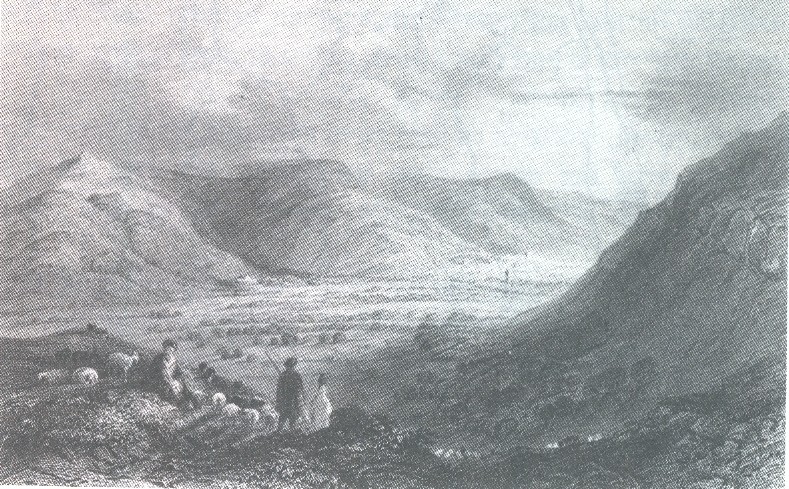
“The Land of True
Life” – between Mt. Gerizim and Mt. Ebal
Since the days of Rabbi Nachman, the
Land of Israel never lost its magic for the Jewish masses. Rabbi Nachman
expressed the force of their feelings 200 years ago in words that could be
written today – and it is with that strength of emotion that the planners of
retreat from Israel’s heartland will have to contend. They’ll be forced to
ask themselves practical questions like: were Rabbi Nachman alive today in
Hebron, what would they do with him? Would they pull and drag him out of
there using the army, or would they maybe leave him there to his fate?
Although the poem’s author is dead and buried, the force of his love and
longing lives in the hearts of many. What will an Israel alienated from its
heritage do with those many?
How will a state that was established
to fulfill the yearning “to be there in the Holy Land” contend with the
decision not to be there anymore, and to actually remove violently in
a state-sponsored pogrom those who dwell there, so that “the joy of the
world” will now belong to strangers?
How will it look and how will it
function, an Israel stripped, wounded, and anguished, a post-retreat Israel,
a land depleted of morale, a pampered state, rationalistic-hedonistic,
bereft of dreams, lacking hope and “illusions”, sliding down the slope of
loss of faith in itself and the justice of its cause? After the heart
breaks, after the pillars of faith collapse, will not the gates by which the
enemy will enter open from within, without the firing of a single shot?
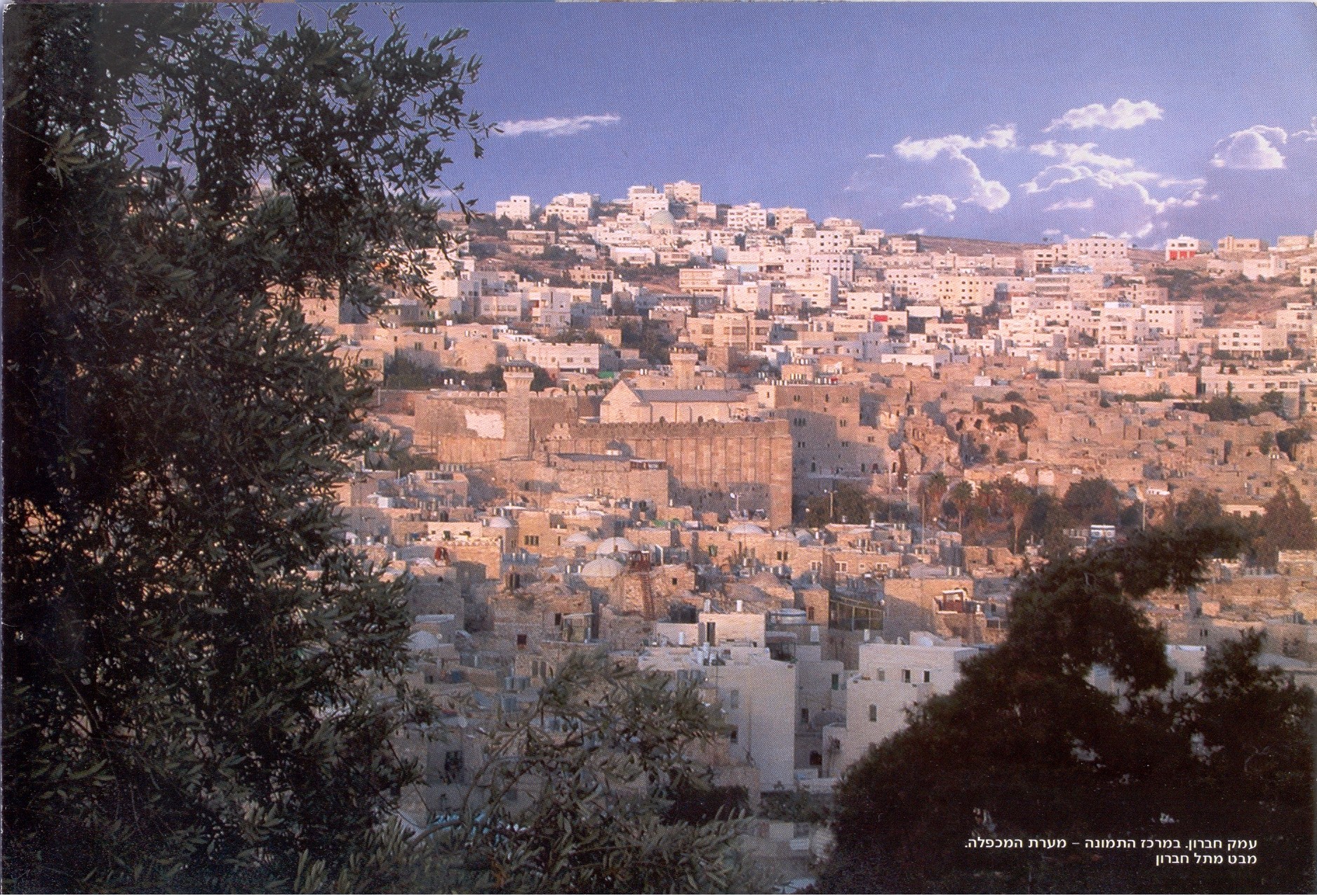
“The Root of the Holiness of Your
People Israel” –
The Cave of the Patriarchs in Hebron.
Chapter 2:
From Zionism Back
to Territorialism
We open with a word pair: The Land of
Israel – The State of Israel. Zionism, most simply, is the return of the
Jewish nation to Zion, as expressed in the foundational “Law of Return”.
But how can this land be called “Zion”
without Jerusalem, Bethlehem, Hebron, Jericho, Beit El, Shilo, Shechem, the
mountain and the desert? These are the places where the events of the Bible
transpired and where the spirit, soul, and character of the Jewish people
was formed. The voluntary hand-over of Zion to the Arabs can only be a
perversion of Zionism, a Zionist absurdity. The wonder of the matter is that
those who support this convolution actually dare to call themselves
“Zionists”.
In both the world and in Israel, there
are plenty of Jews who are not Zionists, and among them are even enemies of
Zionism. We have no quarrel with these Jews since we lack any point of
contact with them. The unfolding national tragedy arises out of the gaping
chasm that exists among Jews who believe that the State of Israel is indeed
meant to return the Jewish nation to the Land of Israel to regain
sovereignty. The tragic break is taking place within the camp, among those
whose national worldview rests on the three pillars of people, land, and
sovereignty, among those who are cognizant that if one pillar collapses, the
whole building crumbles
A Zionist, as opposed to a “territorialist”,
will not give up the Land of Israel side of the triangle, because unless it
is in the Land of Israel, he has no interest in sovereignty. As for the
territorialists, sovereignty is what’s essential and it doesn’t matter if
that sovereignty is actualized in Argentina, Uganda, Birobidzhan, or even a
part of the Land of Israel, if that is what is available. In his eyes, land
is real estate, an incidental basis upon which to spread the tent of
sovereignty – a neutral platform, devoid of emotional resonance.
Behold the irony: We experienced the
wonder of liberating all of Israel west of the Jordan only to invent a new
species of territorialism – one from within the Land of Israel and among the
camp that still calls itself “Zionist”. This new ideology calls for retreat
from the heart of Zion – a cold-blooded, voluntary retreat – out of
considerations of democracy, demography, economy, international support, and
– dare we say it – self-hatred. From now on, other values – social,
economic, liberal, universal – outweigh the foundational significance of the
Land of Israel as an eternal inheritance. Zion is abandoned to foreign rule,
its children exiled to the territorial fringes of the patrimony.
Chapter
3:
The State of Israel Exiles Itself from the Land of Israel
There is yet another face to this
national tragedy. Until now, we’ve seen the emigration of individuals from
the land, but now the state itself is emigrating. We now find conflict and
contradiction where there should be complete congruence between the land,
its settlement, and sovereignty over it. This conflict arises from selfish
considerations: Dizengoff is surrendering the Western Wall, Herzliya is
surrendering the Cave of the Patriarchs, and Holon is giving up the Tomb of
Rachel. It is analogous to a missile that has strayed from its course, to
stomach enzymes that are eating the stomach in a pathological process. The
tool that was meant to bring the Jews to the Land of Israel, is
removing them from it. Like the Golem who suddenly turns on his master,
the state has arisen against the land to give it over to strangers. It turns
its back on the heartland, faces the coast and exchanges the call “return!”
with the cry “retreat!”
But the state is not simply retreating
from the land – it is exiling itself from it. Retreat is a military term,
markings on an operational map, denoting a tactical exigency. Exile,
however, uproots the heart. And far more bitter and fateful than ordinary
exile is voluntary exile, because it turns its back on Jewish history and
steals its future. The third exodus of Jews from the “beloved land” on the
path of exile began in August 2005, when 10,000 Jews were expelled from 25
communities in Gaza and Northern Samaria, this time to an exile within the
Land of Israel.
After this event, everything quickly
returned to normal because the extinction of Jewish life in these areas
wasn’t accompanied by violent clashes. The uprooted and expelled exhibited
‘passive obedience’. Nonetheless, the event penetrated to the depths of the
national consciousness, and from that place it allows the nation no peace.
The violent clash in Amona is connected to the expulsion from Gush Katif as
another point on the same continuum.
If there is a next wave of expulsions,
it will not be another event, but the beginning of the end of the modern
return to Zion known as Zionism. It will be a national catastrophe, a unique
“Ninth of Av”, which the Nation of Israel will mourn as a destruction that
it brought upon itself. To the names of the historic destroyers, like
Nebuchadnezzar King of Babylon and Titus Commander of the Roman Legions,
will be added Jewish names. How can we be comforted after such a day?
“Again you shall plant vineyards on the
hills of Samaria,” says Jeremiah (31:4), but how can we plant once we’ve
freely given those hills to strangers?
What
tidings can Jeremiah’s unforgettable words still carry, once our own actions
have emptied them of their contents?

The exile from Gush Katif, 2005
“Erect markers,
Set up signposts;
Keep in mind the highway,
The road that you traveled.
Return, Maiden Israel!
Return to these towns of yours!” (Jeremiah 31:20)
The markers erected for our return now
point the way out, the signposts say “leave!”, and the highway has become a
highway of expulsion. Where will the “Maiden Israel”, befouled and betrayed,
return to, once “these towns of yours” have become Palestine?
Try, dear reader, to read another
prophecy through the eyes of a Jewish child in the year 2106, after 100
years of Palestine:
They shall return from
the enemy’s land.
And there is hope for your toils
– declares the Lord:
And your children shall return from enemy country.
And there is hope for your future, says the Lord,
And the sons will return to their border.” (Jeremiah 31;14-16)
To where will the children return?
Where is their border? In the Palestinian city of Bethlehem? There is no
return and no comfort after voluntary exile. The break is irreparable.
The government of Israel is steering
the nation towards a tragedy of historic proportions: it will turn the
Bible from a prophecy fulfilled to a prophecy proven false. This will be
the end of the Zionist ethos, a spiritual break whose like the Jewish people
never before experienced, because this time the blow does not come from
without, but from within.
Chapter 4:
The
State of Israel: The First Jewish Representative Body to Surrender the
Land of Israel?
The shock of this deed is in its lack
of precedence. Never, in our whole history has a Jewish person or body
signed a document surrendering Jewish rights to the Land of Israel. And were
it to be imagined that gentiles would force some rabbi or community in Rome,
Warsaw, or Bagdad to sign such a document, who would that piece of paper
obligate? It would be worthless.
And who would dare arrogate the
authority to obligate the nation to a fateful breach like this? In all our
years of weakness and humiliation, when we were either a barely-tolerated
minority or a persecuted one, not only did a Jew never “surrender” the Land
of Israel, never would it even have occurred to a gentile to demand such a
thing of us.
And now – what bitter irony and what
twisted destiny – the “generation of the redemption”, with its great
military and physical strength, has been stricken with such weakness of soul
and spirit that we will bring this spiritual disaster upon ourselves. “The
generation of the resurrection” turns into the “generation of the downfall”,
a generation that has lost its faith and its way.
Has it been decreed that this torch,
passed from generation to generation throughout the darkness of exile, is to
be extinguished just now, when it reached its destination in Zion? Will the
chain of the generations, all of whose links held fast despite the pressures
of persecutions, forced conversions, and genocides, break just now, at the
link that at last closes the circle of return to Zion?
Will not the Jewish people reject an
idea so insufferable, a notion too poisonous to be swallowed: that the State
of Israel was established to provide the people of Israel, for the first
time in its history, with authorized representatives to nullify its right to
the Land of Israel?
Is this, then, the true destiny of the
State of Israel? Is it to be a cancer that devours and destroys the Jewish
Land of Israel? No longer a state that rebuilds, but a state that destroys?
Will the State of Israel, the apex of Zionism’s achievement, destroy,
pervert, overthrow, and bury the very Zionism that created it?
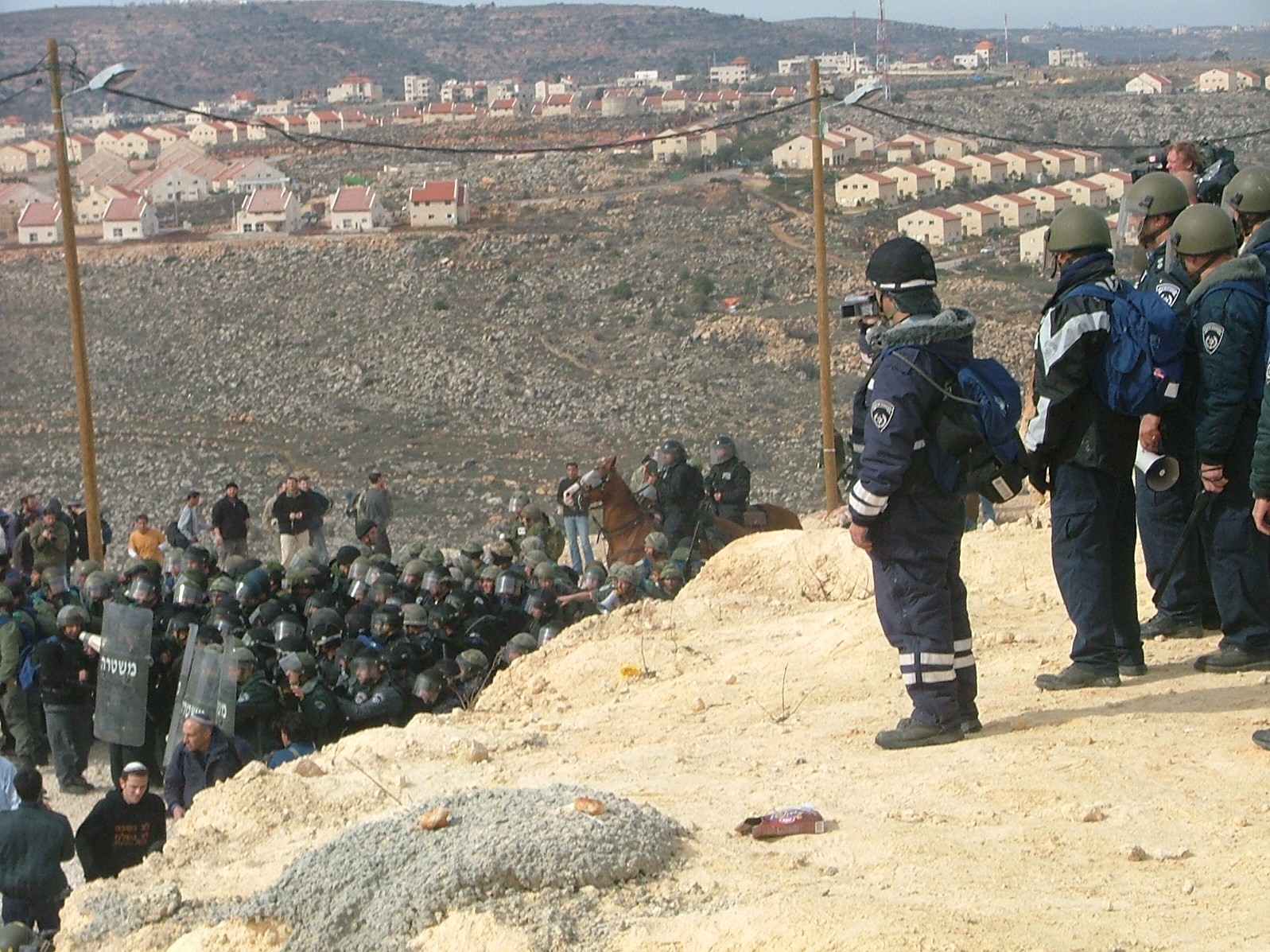
Amona – the forces array themselves
Chapter 5:
The
Unwritten Constitution of the State of Israel
The fatal clash between the State of
Israel and the Land of Israel also has legal facets. Israel, unlike most
nations of the world, didn’t spring in an organic manner from an existing
reality. All the nations of the world arose from families, tribes, urban and
rural settlements, that united to become a nation after they already found
themselves settled in their geographic place. And when all these social
entities organized themselves into nations, they raised the roof of
statehood on their already existing houses.
Israel was built from the roof down.
And it was built according to a plan. Before the Jews returned en masse to
their land, they had a program which encompassed the purpose of their return
and the dream they were seeking to fulfill in this old-new land. In other
words, the platform for the new state was decided at the outset. This
platform is Israel’s unwritten constitution. On its tablets are inscribed at
least these commandments: the incontestable right of all Jews to immigrate
to the Land of Israel, to settle it, and to establish a sovereign government
on its soil. These “commandments” didn’t originate with modern Zionism, but
are the genetic code of the Jewish people. They begin with “Leave your
country, your homeland, and the house of your father to go to a land that I
will show you” (Lech Lecha) and continue by way of “If I forget thee,
O Jerusalem” to this very day. This code, in its modern incarnation called
Zionism, has been physically imprinting the land and molding its appearance
for upwards of 120 years now. The State of Israel was destined to be –
according to the plan that preceded its establishment—the instrument for
actualizing this code by fulfilling the memories, longing, desires, and
dreams of the Jewish people.
A State of Israel standing against the
Land of Israel will no longer be the state that was established according to
the Zionist idea. It will be a state that has cut itself off from its roots
and the founding idea for whose actualization it was created. This
development is similar to the kibbutz becoming high-end residential real
estate, or to a New York synagogue becoming a church after the Jews left the
neighborhood.
A historical perversion on this scale
can be executed in two ways: by attacking aliyah and settlement. It
is no accident that the British White Paper of 1939 took aim against these
two cornerstones of Zionism: free immigration and settlement. Aiming to
prevent the establishment of a Jewish state, the British disabled its
foundational platform by choking off immigration to a bare trickle, and
making the Biblical heartland of Judea and Samaria the center of “Zone A”,
where Jews were forbidden to purchase land or to establish Jewish
settlements.
Did we need Jewish sovereign rule over
the Land of Israel so that a Jewish government could step into the shoes of
the British Empire and implement the anti-Semitic White Paper, preventing
Jewish settlement in that very same “Zone A”?
What is this, if not a violation of all
the rules of the game, a nullification of the Zionist enterprise, a breach
of the fundamental, unwritten constitution of the state?
Chapter 6:
The Law of Return
In 1950, the Knesset formalized one of
the fundamental pillars of the unwritten constitution when it legislated the
Law of Return. The language used to formulate this law places it at the
juncture where Land and Nation meet. The Law of Return guarantees every Jew
the right to immigrate – but to where? Five key (Hebrew) words were chosen
to express this basic constitutional right 17 years before we merited to
once again behold the most beloved of Biblical landscapes. Those words
guaranteed that the State of Israel would be a Zionist and a Jewish state.
They appear in the first paragraph of the law, which is entitled “The Right
to Aliyah”: “Every Jew has the right to immigrate to the Land.”
The right is not to immigrate to the
State, but to the Land. In the other paragraphs, the law makes a clear
distinction between Israel the state and Israel the land. The legislators
were careful to specify that the right to immigrate was paired not to the
state, which is the framework, but to the content of this framework, which
is the land itself. Thus, the founding fathers of the state transmitted to
us a meaningful message: the state serves as a tool to bring the Jews...to
the land!
This means that the Law of Return
grants every Jew the right to immigrate to Shechem. Although this right
could only be actualized starting in June 1967, the decisive act, the
establishment of the right, took place back in 1950.
It follows that any governmental act
which denies a Jew the possibility of immigrating to the Shechem area,
whether by formally surrendering the territory to foreign rule, forcing Jews
out, or closing the area off to Jewish settlement, is an illegal act, which
violates the Law of Return.
Although the Knesset has the power to
change the Law of Return, and although the Supreme Court has the power to
interpret the expression “to the Land” differently than it was interpreted
here, such acts would be illegitimate. If not on the legal-technical level,
then at least in the sense that such acts would contradict the unwritten
constitution of the Jewish state.
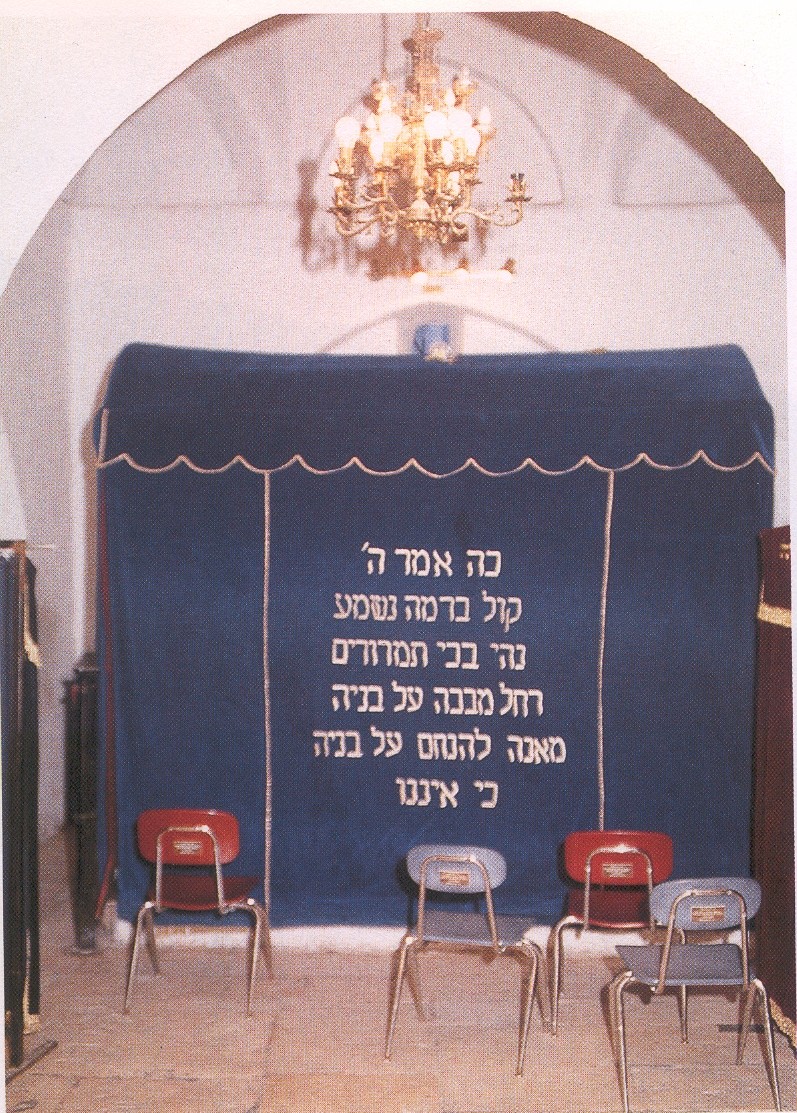
And the sons will
return to their border” – the Tomb of Rachel
Chapter
7:
Canceling or Limiting the Right to Aliyah
While we are still within the purview
of the Law of Return, let us imagine to ourselves that responding to
international pressure or to internal “secular-democratic” pressure, the
Knesset decides to cancel the Law of Return and put an end to the right of
unlimited Jewish immigration that the law guarantees. How would the Jewish
people react to such a move? Would it be accepted and obeyed? Wouldn’t the
Jewish people indignantly label such an arrogation of power by the Knesset
as illegitimate? Wouldn’t Jews, Israeli and non-Israeli, once again
undertake an “illegal immigration” as in the days of the British White
Paper? And whom would the smugglers seek to evade? Those who would enforce
the “Closing of the Borders to Jews” law would be the security forces of the
State of Israel, Jews themselves, whose job description the state had turned
upside down.
Now, let us ask: will he who
circumvents the enforcement of this illegal law be judged a criminal by
public opinion, or will he be judged as one who helped reestablish the
fundamentals of a state that had lost its bearings?
We can now return from aliyah
back to settlement: Is there even a distinction between the two? Are they
not the same thing? The immigrant who reaches the land immediately becomes a
settler! And conversely, who is a “settler” but one who first immigrated to
the land? And what is the difference between distancing the land from a Jew
by abrogating the Jewish right of immigration and distancing the Jew from
the land by surrendering it to foreigners or forcefully expelling him from
it?
Since
aliyah and settlement are nothing but two sides of the same coin,
preventing aliyah to the land weighs equally with holding back the
land from the oleh, the immigrant. Both restrictions do fatal injury
to the unwritten constitution of the Land of Israel.
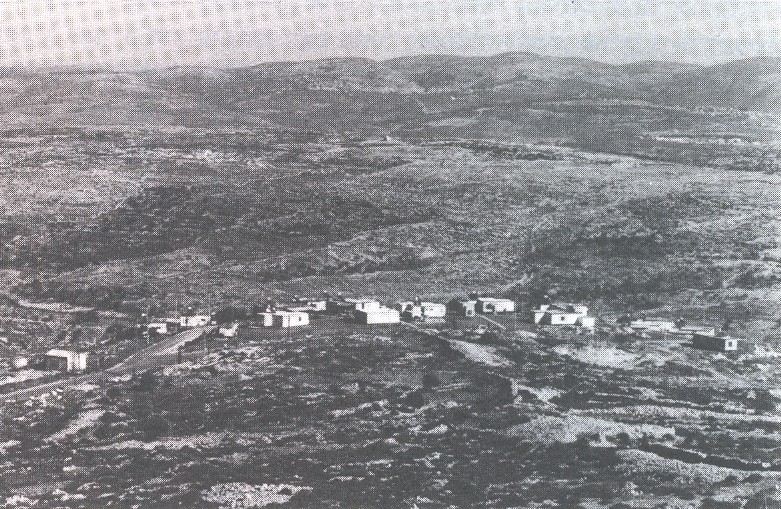
The beginning of settlement in Kedumim
Chapter 8:
The
Annexation of Jerusalem Based on Israel’s
Sovereign Power over All of the Land of Israel
Immediately after the Six Day War, the
government of Israel decided that the State of Israel would annex liberated
Jerusalem. At the time, Yaakov Shimshon Shapira was serving as Minister of
Justice, and it is fitting that his name be engraved in our history books,
if only for the words he spoke before the Knesset at that great hour.
But first we must understand what
“technique” was used to effect the annexation. An amendment was added to the
important constitutional law, “The Government and Justice System Act
(1948)”, by which the Knesset granted the government the authority to apply
and enforce Israeli law in all territory “in the Land of Israel” by issuing
a simple governmental order. In the language of the new article (11b):
“The State will apply its law, justice, and administration on any territory
of the Land of Israel that the government designates by order.” (The
legal-technical definition of “the Land of Israel” in the Israeli
legislation are the borders of the former British Mandate.)
This legislative technique is unique
and unprecedented in international law: a parliament granted authority to a
government to annex conquered territories to the conquering country by way
of a simple administrative act. In other words, if and when the government
wishes to unify Shechem and Hebron with the State of Israel, it does not
have to bring the matter to a vote in the Knesset. It is enough for an
ordinary session of the government to promulgate an order.
Now we can better understand the words
that Ya’akov Shimshon Shapira spoke in the Knesset, in bringing this
historic legislation (Knesset minutes, vol.49, page 2420): Regarding “our
return to Judea, Samaria and Gaza”, he pointed out that “the IDF liberated
from foreign rule substantial portions of the Land of Israel” and that “the
application of Israeli law, justice and administration” in those areas
requires “a clear act of sovereignty on the part of the State”, regarding
“parts of the Land of Israel that are by rights and in fact (in Hebrew, “halakha
lema’ase”) under its rule.”
Moving from style (who uses such
language anymore?) to legal substance: What is the meaning of “by rights and
in fact” rule as entitlement for annexation? There is no escaping the
conclusion that “by rights” is the natural right of the Jews to the Land of
Israel, our unwritten constitution. Only on this basis, could the Knesset
draw the authority to grant the government the power to annex portions of
the Land of Israel.
Using this technique legislated by the
Knesset, the government on that very same day placed liberated Jerusalem
under Israeli law and judicial and administrative rule, with borders that
were drawn on an attached map.
This brings us to the essential
question: the act of establishing sovereignty over Jerusalem – when was it
done and by whom? It clearly was not the governmental order that effected
the act, but the legislation of the Knesset when it granted the government
the authority to annex any territory that is part of the Land of Israel to
the state by a simple order. This was the decisive step in defining the
nature of the Land of Israel as liberated as opposed to occupied territory.
This can be likened to a man who gives
his friend a closed purse, permitting him to open it and take out what he
wants, whenever he wants. In exactly this way, the Knesset granted the
government full disposition over Jerusalem, Judea, Samaria, and Gaza. The
granting of this discretion was an investiture of ownership, expressing
Israel’s right to rule over every part of the Land of Israel, even if this
right has not yet been practically utilized over most of the area.
Whoever wishes to deny the government
this right to apply sovereignty by simple order, which is exactly what the
various “disengagement” and “convergence” plans do, prejudices not only the
unwritten constitution of Israel, but also its duly legislated law.
Chapter 9:
Alsace and Lorraine – Judea and Samaria:
Historical Attachment and National Interests
During an international symposium on human rights in 1971, Meir Shamgar,
Israel’s attorney general at the time and later the chief justice of the
Supreme Court, lectured on the application of the international conventions
on war to Judea, Samaria, and Gaza. He made an official claim that these
conventions did not automatically apply to that area. In the words of his
speech (published in the Israeli Annual of Human Rights, 1971, page 263):
Territory conquered doesn’t always become occupied territory, subject to the
fourth (Geneva) convention...a different approach would lead to the
conclusion that France, for example, would have had to act in
Alsace-Lorraine in accordance with the rules of the Hague Convention...
As is known, France treated Alsace-Lorraine as liberated territory, and
didn’t apply the conventions on war there. Israel also refused to see these
conventions as applying to Judea, Samaria, and Gaza, but nonetheless
undertook to follow the humanitarian rules of the international conventions
as a non-binding act of good faith. For this reason Israel also abstained
from calling the area “occupied territory”, and chose a middle path –
“administered territories”.
Another attorney general, now also a Supreme Court justice, Elyakim
Rubenstein, dealt with this subject at the height of the negotiations that
Prime Minister Barak held in Camp David and Taba, when he offered an Israeli
surrender of more than 90 percent of Judea, Samaria, and Gaza, and almost
all of East Jerusalem. Rubinstein, in an unusual move, presented Barak with
a “legal clarification” (published in July 2000) regarding UN Security
Council Resolution 242, on the basis of which Barak was conducting the
negotiations. He wrote, inter alia:
There has never existed a recognized border between Israel
and the areas of Judea, Samaria and Gaza...the negotiations should be
based among other things on the religious and historical connection to
Judea, Samaria and Gaza, on the geographical facts and their influence
on the security needs of Israel, on the fate of the settlements and the
close link to Israel, and to Israeli national interests...
If the reader should ask what historic and religious connections have to do
with a legal-juristic opinion, he’ll find the answer in the thesis of this
booklet: the unwritten constitution of the state of the Jews.
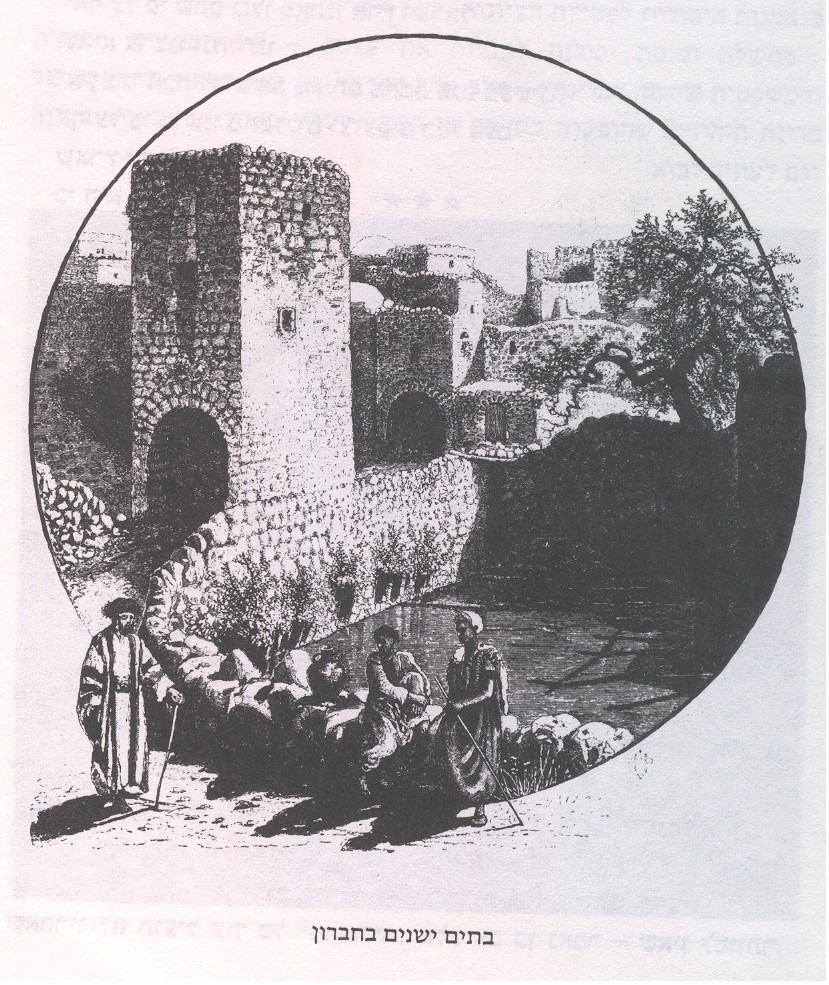
“A historic attachment”
Chapter 10:
Is There Such Thing
as an “Illegal Law”?
What is the status of a government and
a Knesset that violate the unwritten constitution of the State of Israel and
cause the state to betray its mission and to stray from its existential
principles?
To answer this question, we have to
make the clearest of distinctions between the state and its government. The
former is given into the hands of the latter in trust only. Neither the
Knesset nor the government “own” the state, they rather administer its
affairs as trustees, with all the attendant obligations of trust. The
government is like a flesh and blood trustee entrusted with property, who
has the power to perform any legal act – including buying or selling – but
is subject to his duty of trust and the limit of his authority. If he
oversteps this limit, he’s in breach of trust.
The Knesset and government have
apparent unlimited legislative and executive powers, including the power to
dismantle the state and to surrender it to the enemy. Therefore, the
relinquishment of Judea, Samaria, Gaza, and East Jerusalem to foreign rule
would obviously be included within governmental powers. However, although
the power exists, do the Knesset and government have the authority
to surrender the Jewish right of ownership over the Land of Israel? Or would
such an act be a betrayal of their office and trust? Clearly, determining
the very right to the land itself exceeds the authority of the Knesset, and
still more so of the government, since that right precedes them.
The civil, human, and other basic
rights of every democratic society are anchored outside and beyond the reach
of the state’s power and authority. This truth and principle receives its
most famous formulation in the American Declaration of Independence:
We hold these truths to be self-evident,
that all men are created equal, that they are endowed by their Creator with
certain unalienable Rights, that among these are Life, Liberty and the
pursuit of Happiness. That to secure these rights, Governments are
instituted among Men, deriving their just powers from the consent of the
governed, That whenever any Form of Government becomes destructive of these
ends, it is the Right of the People to alter or to abolish it, and to
institute new Government...
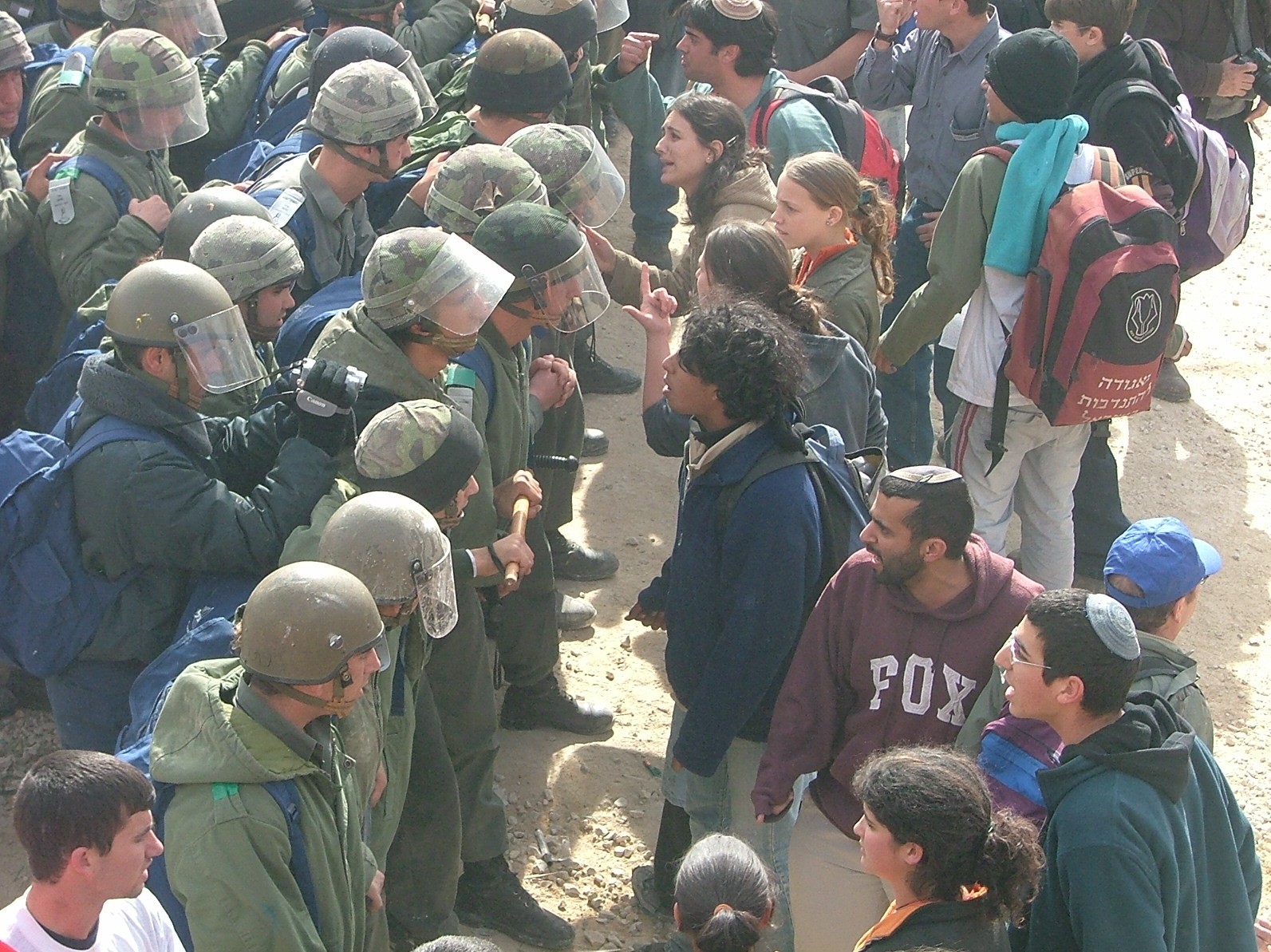
Amona: confrontation
We believe that the list of
“unalienable rights” in the state of the Jews includes additional
“self-evident truths”, including the right to immigrate and to settle in the
Land of Israel. Moreover, all the governments of Israel were established for
the purpose of ensuring these rights – and it is on that basis, and only on
that basis that they derive “their just powers from the consent of the
governed”.
This Jeffersonian principle, embodied
in the American Declaration of Independence, is practically fulfilled in
many spheres. We will bring some examples.
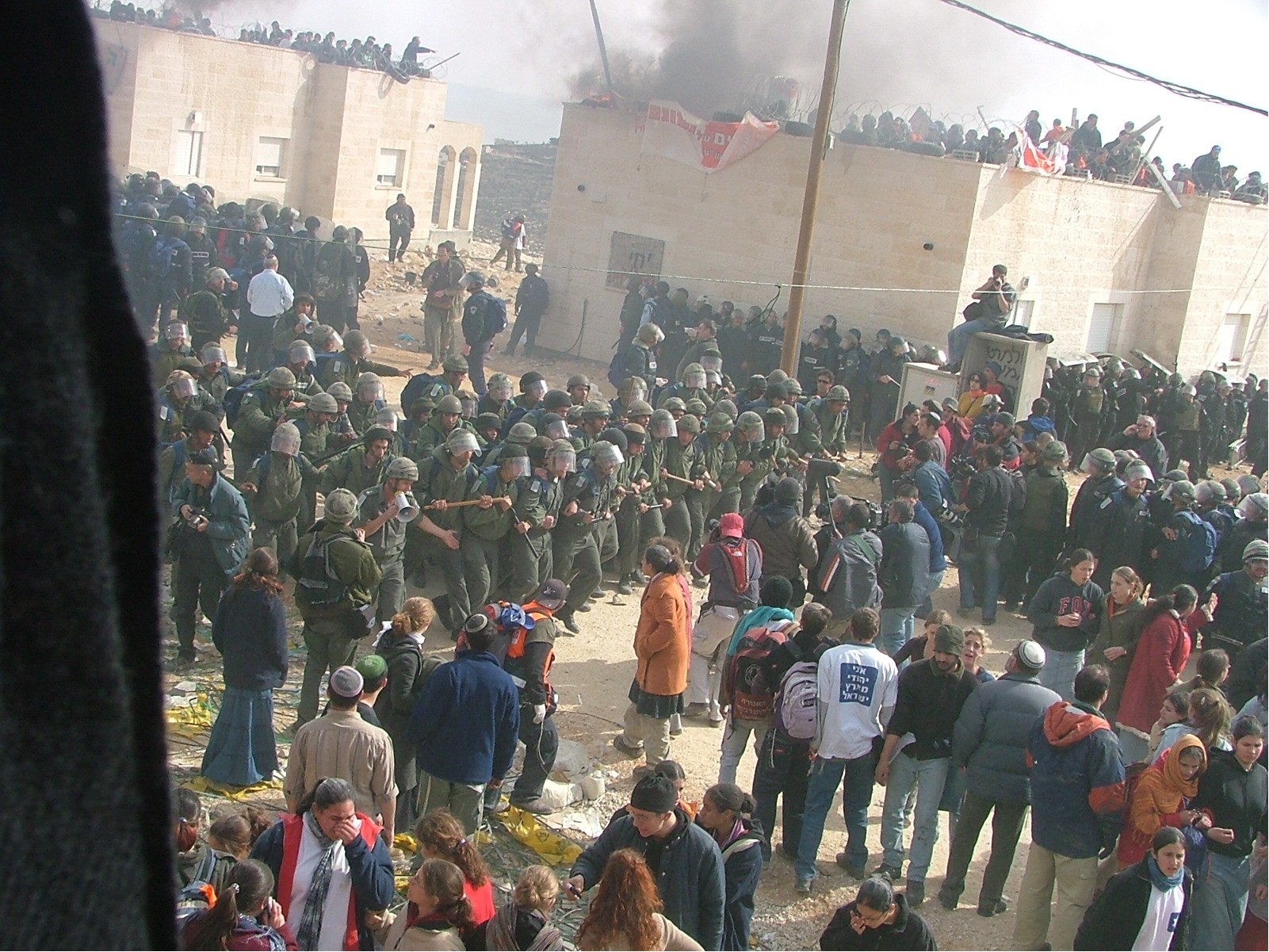
Amona: which
side is upholding the law?
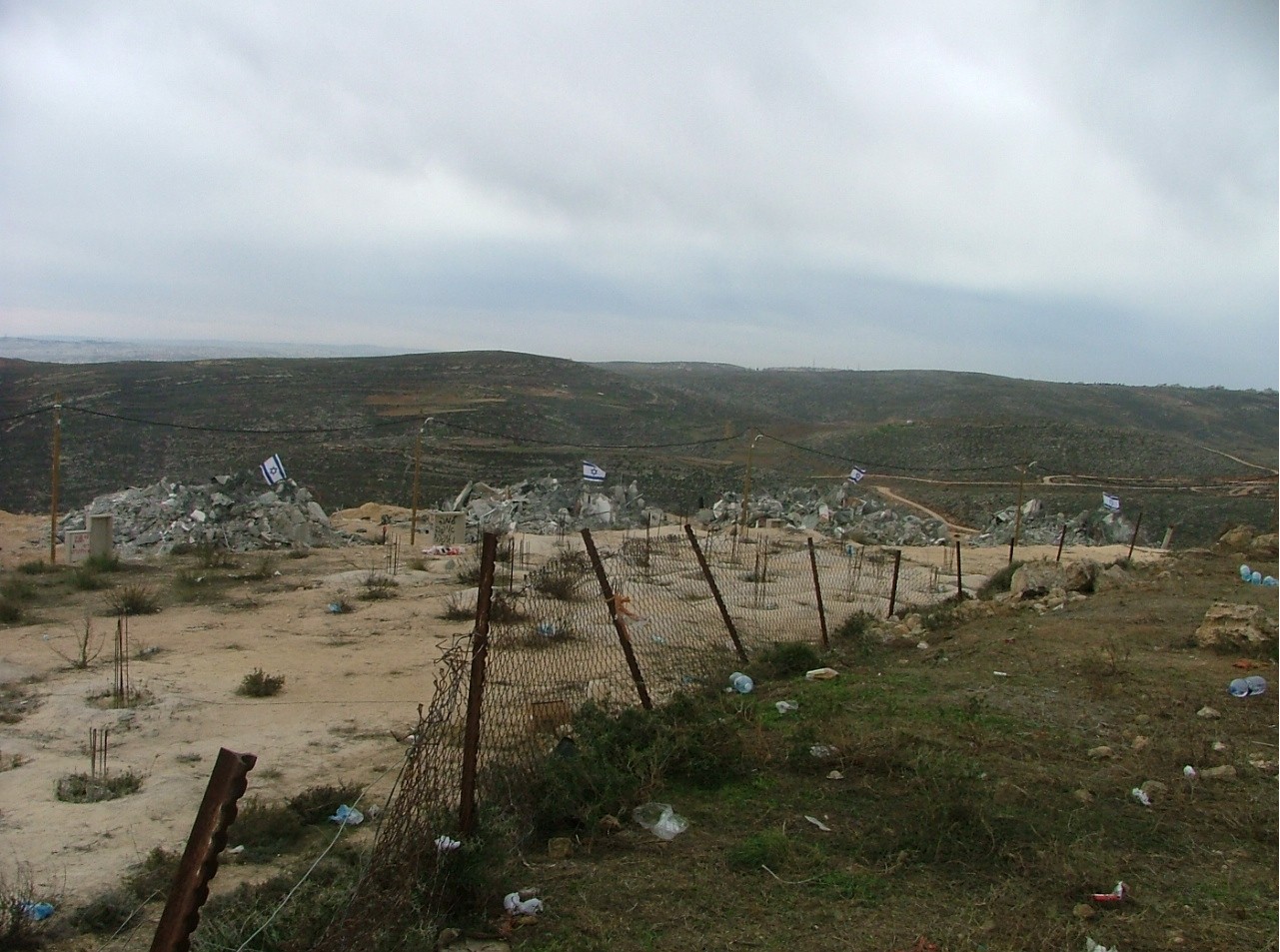
An illegal law – mounds of ruins in
Amona
Chapter 11:
The
Destruction of a Nation (Genocide) or the Destruction of a State
As is known, the perpetrators of the
German genocide claimed in their defense that they were only following
orders. And those who gave the orders claimed that they legally activated
the sovereign powers of the state, above which exists no higher authority.
However, the International Court at Nuremberg, whose ruling was accepted as
international law binding upon every state in the world, held otherwise. The
Court ruled that a law enacting genocide is an illegal law. It also ruled
that those who execute genocidal orders as well as those who enact or give
them, are criminally guilty.
In Israel too, those responsible for
the slaughter at Kfar Kassam were indicted and found guilty on that basis.
Since the order to kill was found to be “patently illegal”, the court didn’t
accept the defendants’ claim that they were simply following orders. But,
just as it is forbidden for a soldier or policeman to follow a superior’s
order to kill, it is likewise forbidden for the superior to obey an illegal
government order or law, such as the Nazi race laws.
The Germans claimed that the state
embodies the highest value, whereas enlightened nations hold that human life
is the supreme value, and that even a democratic majority does not have the
right to take it in an arbitrary way. Those circles in Israel, usually
leftist, that sanctify the state and its majority decisions, and raise them
above foundational rights, perhaps do not realize how captive they have
become to a German philosophy taken to its extreme conclusion by the Nazis
in the Holocaust.
The order to kill that was given at
Kfar Kassam was, in the court’s words, a “black flag” whose true nature
every soldier was obligated to recognize. In our opinion, that same black
flag waves above any intent to surrender the sovereignty of the state to
strangers. Just as a government has no right to order the genocide of a
nation, so too it has no right to order the destruction of a state,
including, of course, its own.
Chapter 12:
The Cancellation of
Democracy
The German Reichstag provided another
example of what a parliament may not do. In 1933, shortly after Hitler
gained power, the German parliament decided by a majority of votes to
“commit suicide” by laying its total authority at the feet of the new
dictator. This legislation, by which the Reichstag terminated its
governance, was called the “Law of Empowerment”, the law that conferred on
the Fuhrer the powers of which the Reichstag had divested itself.
Today it is universally recognized that
the “Law of Empowerment” was illegal and that no institution has the
authority to surrender democracy itself or the basic freedoms that are at
the heart of democracy – even by a solid majority. The free world does not
recognize using the means of democracy to subvert and destroy democracy.
In a state without a constitution like
Israel, governmental power inheres in and is subject to the unwritten
constitution, which is the basis, source, and root of all legislative
enactment.
In Israel’s Knesset sits Mr. Ahmad Tibi.
Theoretically, he can one day achieve a democratic majority to turn Israel
into a “secular-democratic” state in the Arafatian meaning of that term, or
into a Moslem state, à la Hamas. Would we accept such a majority vote
as legitimate? Or would we relate to it as a monstrosity, a golem that
turned against its creator?
Sixty-one Ahmad Tibis would rely on the
“legality” of their majority, and those who would arise against this golem
would speak in the name of our unwritten constitution: that the purpose in
establishing this state was so it could be Jewish and Zionist.
Chapter 13:
Freedom of Religion
and Conscience
Here is a further Jeffersonian right
that cannot be annulled: What would be the status of a duly enacted “Law
against Sabbath Observance”? What about a “Law for Stoning Sabbath
Desecrators”?!
Wouldn’t Sabbath observers and Sabbath
desecrators feel that there was a “misunderstanding” here? That they did not
agree to establish a state together on this basis? That the Knesset so
fundamentally trespassed against the common basis of our mutual existence
that there is no choice left but to either nullify the law or reject the
framework, the state? Let it be said that in this case too, the foundational
basis was violated because freedom of religion and freedom of conscience
precede government and parliament, being the root and source of all
democratic legal systems. Therefore, any legislation that seeks to abolish
those freedoms can be termed an “illegal” or “unconstitutional” law.
To the universal list of sacred rights
that no government can annul without losing its legitimacy, Israel must make
some unique additions. Israel was founded to enable Jews “to make Aliyah
to the Land”, in the language of the Law of Return, and to settle it.
Different sectors of Israelis might value certain basic rights over others
or might not even value certain rights at all, but no sector has the right
to divest the state of its raison d’etre.
A fictional example: Readers on the
left have to ask themselves how they would react if a Knesset were to enact
legislation setting aside separate bathing beaches for Arabs. Would Jewish
leftists go on purpose to the Arab beaches to bathe, as the writer of these
lines would do, to demonstrate their rebellion against the attempt to turn
the State of Israel into a racist state? If so, when will they understand
that there are millions of Israelis for whom the Land of Israel is no less
of an ultimate value?
Chapter 14:
Petain and de
Gaulle
France during the Second World War
provides us with an excellent example of an elected representative of a
democratic state who used the democratic majority to breach the framework of
the permissible.
Marshal Phillippe Petain, “the hero of
Verdun”, was one of the most revered figures in France. He came to power
democratically and legitimately on the heels of the German invasion of
France in 1940. In his capacity as prime minister, he signed a collaboration
agreement with Nazi Germany in exchange for keeping the smaller part of
France, with its capital in Vichy, outside the Nazi occupation. One must
remember that Petain signed the agreement when the Nazis already ruled in
Paris – unlike Jerusalem, Judea, Samaria, Gaza, and the Golan, which
Israel’s enemies did not conquer and had no chance of acquiring by force;
unlike Israel, who won every war waged against it. It must also be pointed
out that in his policy of collaboration with Hitler, Petain relied on a
legal majority within the government as well as widespread popular support.
Moreover: Petain’s decision was born
out of extreme coercion and was not without justification or internal logic.
He saved a part of France from the German occupation, and he obtained
Hitler’s promise not to touch the French colonies. In the current Israeli
political lexicon, many would call Petain’s policy pragmatic.
However, one man, the youngest of
France’s generals, Charles de Gaulle, denied the legality of Petain’s
actions. De Gaulle deserted and escaped to England. From there, he called
upon his countrymen to rebel against Petain’s regime because it betrayed
France’s glorious past and hopes for a restoration of France’s honor.
Vichy France tried General de Gaulle in
absentia in a military court for desertion and treason and sentenced him to
death. The sentence wasn’t executed only because de Gaulle was in London,
outside the Vichy government’s reach. Four short years later, a division of
de Gaulle’s Free French, among other Allied forces, liberated Paris. Again a
French court sat in judgment and this time Marshal Petain was tried and
sentenced to death, inter alia, for the collaboration agreement that
he signed with Germany. Only because of his advanced years, he was over 90,
was his sentence commuted to life imprisonment. He ended his life in island
exile.
It is interesting to contemplate the
strange phenomenon of two French sentences handed down according to the same
law, but with such different results – results that corresponded so
completely with the political situation and ideological outlook of the
regimes in which the judges sat.
There are matters that do not
constitute part of a nation’s legal structure in the sense that they are the
base on which the legal structure rests. If, during an earthquake, the
building’s foundation is destroyed, the legal structure is left hanging in
midair and is of no avail to society. During such times of trial, one must
reinforce the foundations from which the entire system derives its
principles and vitality. Courts owe their existence to the legislation of
parliaments. However, parliaments, too, do not arise out of thin air. They
are established on the basis of foundational norms and can exist only as
long as those norms are upheld. Therefore, it is no wonder that normative
issues like those faced by France during WWII are often beyond the ken of
the courts. Our Supreme Court too, has lately failed over and over again in
upholding them.
Although Israel has foundational laws
to protect basic individual rights and liberties, it does not have
foundational laws that protect basic national and Zionistic values. No laws,
except the Right of Return, protect the State of Israel as the state of the
Jews or the Land of Israel as the land of the Jews. While usually the
Supreme Court is very aggressive (some say much too aggressive) in
intervening to nullify laws it deems objectionable to human rights, it has
recently failed to protect both the most basic individual rights and
collective Jewish national rights. I refer to the majority decision of the
Supreme Court regarding the legality of the Evacuation-Compensation Law, a
law that deprived the Jewish nation of a part of the land of Israel,
deprived about 10,000 citizens of their homes and communities in that area,
and deprived those citizens of some of the most hallowed and basic human and
civil rights.
More often than not, the courts do not
succeed in rising above the weaknesses and failures of governments and
parliaments where fundamental issues are concerned.
As the prophet
Isaiah said (10:15):
“Does an ax boast over
him who hews with it,
Or a saw magnify itself above him who wields it?
As though the rod raised him who lifts it,
As though the staff lifted the man!”
In the days of Isaiah, people did not
know about the separation of powers that democracies strive to
institutionalize, but nonetheless, Isaiah’s vivid description aptly depicts
the inherent weakness in our own democratic system. In political matters,
the courts for the most part continue to be the ax with which the regime hews.
The break between Petain and de Gaulle
was an extra-legal and supra-judicial battle of giants, a war for the soul
of the French nation. The courts, each one in its turn, were nothing but a
saw in the hands of those who wielded it. De Gaulle and his followers saw a
“black flag” waving over the agreement Petain signed with the Germans, and
Petain and his supporters saw things differently. History, or Providence,
decided between them, giving victory to the Allies.
What can we say? With due respect for
the honor of Paris and the soul of France, when Paris was still swamp and
forest, our Patriarch Abraham had already bought the cave of Machpela in
Hebron, Rachel was buried on the road to Efrat, Jacob saw angels
ascending and descending in Beit El, the nation of Israel received
the blessing and the curse on Mount Eibal and Mount Gerizim,
Eli was priest in the sanctuary in Shilo where Chana stood bitter of
spirit and poured out her heart to the God of Israel, King David reigned in
Hebron, Yotam told his parable to the city of Shechem, and
King Omri bought the land upon which he built the city of Samaria.
De Gaulle led the French nation through
a time of crises that entailed suffering, defeat, and humiliation lasting
four short years. The nation of Israel remained faithful to Jerusalem,
Bethlehem, and Hebron, to Shilo and Beit El, to Jericho and Shechem over
thousands of years, in much darker exiles, over terrible, indescribable
suffering and persecutions that are without comparison. If, God forbid, such
a dark “Vichyist” time will come in our own history, when a prime minister
in Israel will do to the Land of the Bible what Petain did to France – who
can escape the comparison?
Chapter 15:
Nation – Land –
State – Democracy
Here is the opportunity to put democracy in
its proper place. Let us rescue it from the demagogues who have made it into
a mystical sacrament, which hovers like the divine presence over human
affairs and our prosaic needs – an end and not a means, a goal for its own
sake instead of a propitious and preferred arrangement.
First things first: For there to be a
democracy, you need a land, and then a people living on the land, and then
the people living on their land need to establish for themselves a state.
Only once those three elements are in place is it relevant to ask how that
state will govern itself. The best solution is, of course, the democratic
one. Democracy is like a protective roof, but can you substitute a roof for
the building? Can a people forgo its land and exchange it for...democracy?
You might as well suggest to a man that he exchange his head for a hat.
Wouldn’t he ask: Without a head, what good does the hat do me? On what will I
put the hat? Or, who would suggest that a man exchange his life
for his health?
This is exactly what the false messiahs
of “peace and democracy” are proposing: give up the heartland for the sake
of democracy. But our very existence is dependent on the Land of Israel.
Without the land, what will we do with democracy? If Biblical Jerusalem and
the historic, religious, cultural, and emotional heart of the land are taken
from us, where will we put this democracy?
A government and a parliament that
abandon the land by democratic process and not due to enemy duress, lose
their legitimacy. Whoever attacks such a regime, just as de Gaulle attacked
Petain, will expose himself to denunciation, silencing, and persecution. It
is a situation that has reoccurred throughout history. The most advanced
nations have suffered historical crises that tore them apart from within.
The split within the French nation caused by the French Revolution has not
been erased until today. The Protestant Huguenots of France, the salt of the
earth, were also forced to leave rather than betray their religious
consciences. In all these instances, the national consensus was torn and
sundered, and the social contract was destroyed. Gone was the basis for the
people to live together in one land, under the canopy of one constitution,
written or unwritten.
Wide sectors of the Jewish people
living in the Land of Israel will face a trial of this kind if their
government decides to abandon the Land of Israel.
Chapter 16:
A
Zionist Dream in a Post-Zionist Reality: To Enjoy the Status of an Arab Village...
Much of the Israeli Left is
“post-Zionist”. This small but powerful sector is not impressed with the
drama of the Jewish Nation’s return to their land after 2,000 years of
exile. It is not interested in the Jewish People’s moral or legal claims to
the Land of Israel. It wants “a state of all its citizens” – an abstract
ideal of a secular state in the Middle East – that has no connection to
religion or nationalism, whether Jewish or Muslim. For those of this
ideological stripe, arguments about Israel’s unwritten constitution or the
trauma to Israel’s Jewish soul carry no weight; their highest authorities
are human rights and democracy. This section is for them. It demonstrates
that retreat and expulsion also violate the norms of democracy and core
human rights.
It is claimed that opposing the
relinquishment of parts of the Land of Israel is anti-democratic since a
democracy does not permit a minority to impose its views on the majority.
Let us assume only for the sake of argument, that the majority supports the
destruction of Jewish communities and the expulsion of their inhabitants,
although in the actual case of Gush Katif and Northern Samaria, the
government acted contrary to its electoral mandate.
The minority, so the argument goes, has
a right to protest and demonstrate, but at the end of the day is required to
accept the majority decision on every matter. This simplistic determination,
while correct in general, is subject to an important caveat, which goes to
the very essence of democracy. As discussed earlier, fundamental human and
civil rights cannot be abrogated by majority decision. Only once this basic
ground rule is observed, do the democratic “rules of the game” come into
play.
A regime lacking basic respect for
universal human rights – the rights to life and property, to freedom of
conscience, expression, and assembly, the right to fair and impartial
justice and to equality under the law – such a regime is no longer a
democracy. Therefore, when we say a democratic state “cannot” abrogate basic
rights, we mean that it cannot do so and still remain a democracy.

Gush Katif 2005 – in the stream of
exiles
The expulsion of the Jews from Gaza
and the Northern Samaria and the destruction of their communities violated
many basic and universal rights, and therefore seriously damaged Israel’s
democracy. From here it follows that whoever opposed this expulsion,
including by means of non-violent disobedience, followed in the best tradition
of Western enlightened democracies. These opponents defended both the
national and universal values that were violated by the brutal expulsion.
Let us revisit what happened in Israel.
A government sent the armed forces of the state to physically wipe out
strongholds of the governing majority’s political and cultural rivals,
uprooted about 10,000 citizens by force from their homes, turned them into
refugees, and cut off their means of support.
A similar act undertaken by the
government of the former Yugoslavia in Kosovo against its Muslim citizens
was considered a crime against humanity. The person responsible for this
“ethnic cleansing”, Prime Minister Slobodan Milosevic, was tried before the
International War Crimes Tribunal in The Hague. He died in prison.
Both in Kosovo and in Gaza and Northern
Samaria, the victims were citizens of the expelling state and they were
slated for expulsion based on their religion alone. In Kosovo, Muslims were
expelled because they were Muslims; in Israel, Jews were expelled because
they were Jews.
For this reason, the “Disengagement”
was not only a national crime – as detailed in previous sections – but also
a crime against humanity.
Let us ask: did the government have the
option of abandoning Gaza and Northern Samaria, thereby transferring
sovereignty over the areas of Jewish settlement, as long as it did not
violate the individual rights of the Jewish residents – in other words,
leaving them in their homes and communities to their fates?
History has provided numerous instances
of territories and their residents undergoing changes of sovereignty in the
extreme context of war and its aftermath. In many cases, the residents were
given the choice of either staying in place and receiving citizenship of the
annexing country or retaining citizenship of the withdrawing state and
physically leaving with it. The Italian Ticino region was transferred to
Switzerland. The Alto Adige region (Southern Tyrol), which is mainly German
speaking, was transferred to Italy. Posnan changed hands from Poland to
Germany (Prussia) and back; Alsace-Lorraine changed hands a number of times
between Germany and France. In all the above instances, residents were
allowed to remain in their places.
Extrapolating from historical
precedents, Israel could apparently have withdrawn from territories and left
its Jewish residents in place, whether as Israeli or Palestinian citizens.
In such a case, the settlers and their supporters could not have claimed
that democratic fundamentals were being violated.
But only apparently. In reality, no
Jews under the “protection” of any Palestinian regime would have a chance of
remaining alive, never mind enjoying fundamental human and civil rights such
as are enjoyed by the Arab citizens of Israel. Indeed, the certain death
sentence that would await any remaining Jews was the Israeli government’s
justification for the expulsion and the planned future expulsions. It
follows that any proposals purporting to give the settlers a choice to stay
in their homes or to leave with the withdrawing army, would be nothing but
an empty gesture. What animal with its survival instinct intact would choose
to remain caged alone with a tiger?
If the situation is such that a
decision by the government of Israel to withdraw from territory necessitates
the forced expulsion of the territory’s Jewish inhabitants, which interest
deserves precedence? The political interest of the current leadership to
withdraw from territory it perceives as not in the nation’s best interests
to maintain, or the human and civil rights of the minority, the preservation
of which precludes the possibility of withdrawing?
In deciding, let us remember that the
state itself settled some 300,000 of its citizens in these territories
starting 40 years ago. The settlers sunk deep roots, both physical and
spiritual. They invested their energies, their youth, their dreams, and
their future in the patriotic mission of reclaiming their people’s heritage.
Their livelihood is dependent upon their dwelling places: they built their
homes there, they planted trees, fields, and vineyards, they built
hothouses, established synagogues and houses of study, they set up
educational and cultural institutions, and they established industries. The
vistas of Judea, Samaria, and Gaza are the vistas of the childhoods of their
children and grandchildren. Neither is the amount of blood they spilled on
its soil negligible, nor the number of graves dug. The shocking memories of
dozens of synagogues ablaze in Gush Katif – a sight unseen since
Kristallnacht 1938 was now repeated in the State of the Jews – and dug
up graves with their remains exhumed, these are wounds that continue to
bleed, and are bound to leave ugly and permanent scars on the nation’s
psyche.
Can all the above trump the majority’s
decision?
To answer this question, let us turn
from the Jews to the Arabs – on both sides of the Green Line – against the
background of what the majority perceives as a demographic threat.
There are two conflicting reactions
among the Jewish-Israeli public to the perceived demographic threat posed by
the Arabs. A substantial number of Israelis (perhaps at times even a
majority) support a “solution” involving the transfer of as many Arabs as
possible out of Israel, whether by voluntary means such as providing
monetary incentives, or by force. However, there also exists a solid
majority, comprised of both the political right and left, for whom such an
idea is beyond the pale, outside of any legitimate political debate,
non-existent in the political and diplomatic lexicon of Israel.
Here we have before us a diplomatic
step that the majority sees as being in the clear interest of the state, but
is nonetheless regarded as being beyond consideration. There is a general
consensus that any political or diplomatic moves to solve pressing and even
existential national problems cannot come at the expense of the fundamental
rights of the Arab minority. It was in this spirit that Israel’s Supreme
Court ruled regarding the location of the separation fence, and it is in
this spirit that it never even occurred to anyone to uproot an Arab village
to establish a defensible border. In any negotiation over a new map, the
location of every Arab village is considered an unalterable given; every
negotiator and planner accepts this as a fixed working assumption.
If so, why is the government of Israel
unprepared to extend the same logic to Jewish settlements? This is not a
matter of international or domestic law; it is a psychological problem, a
problem in the soul of the nation. The destruction of Jewish settlement is
not mentioned in the Oslo Accords or even in the “Road Map”, which calls
only for “freezing” Jewish settlement. At the dawn of the 21st
century, it is unthinkable for an international document to call for what,
for all intents and purposes, is ethnic cleansing. It is also inconceivable
that any foreign power would send its army to execute the expulsion of Jews
from the Land of Israel. Only the Jews themselves decided on the expulsion;
only they volunteered to execute it against themselves. There are those who
see such behavior as a hereditary defect in the nation’s genetic pool.
To complete the picture, we need add
that Jewish settlement in Judea, Samaria, and Gaza and the parts of
Jerusalem that were annexed to Israel in 1967 were executed by formal
governmental decision. The government both funded and implemented these
decisions. It encouraged Jewish settlement in these areas, materially and in
spirit. Legal representatives of the government called before Israeli courts
rejected claims that Jewish settlement in Judea, Samaria, and Gaza
contravened the Geneva Convention. Although the government did not annex
those territories, it purposefully used the term “administered territories”
and avoided the term “occupied territories”. The government of Israel’s
stance, that Jews have a right to settle in all parts of historical Israel
west of the Jordan River, was expressed publicly by representatives of the
government on every international platform and in all the courts of the
land.
All this should suffice to substantiate
the modest claim that Jewish residents in Judea, Samaria, Gaza, and East
Jerusalem have rights in no way inferior to those of any Arab village to
continue residing in problematic areas. In any diplomatic arrangement
arrived at, they too have the right to stay on living securely within their
communities and enjoying fundamental rights. If the State of Israel could
secure its Jewish citizens those guarantees, then from a purely democratic
and human rights standpoint – without reference to the nationalistic aspect
– there would be no objection to handing over those territories to a foreign
power.
In conclusion: as long as the rights of
Jewish settlers cannot be guaranteed – foremost among which is the right to
life – Israel cannot legitimately retreat from any territories. In the
course of two generations, irreversible facts on the ground were established
and rights were acquired that cannot be overturned – even by a democratic
majority. And here is the proof: As part of the political discussion of the
Arab demographic problem, there have been proposals to transfer the town of
Um Al-Fahm to Palestinian sovereignty, together with its inhabitants.
However, there is not a political party in Israel that ever considered the
notion of expelling the residents of that city over the border while leaving
its land in Israel’s hands.
Prominent political and cultural
leaders of the Left have publicly proclaimed that the expulsion of Arabs,
even at the behest of a democratic majority, would justify and compel revolt
against the government. As an example: Yossi Sarid and Yair Tsaban, both
former government ministers, called on the army not to obey an expulsion
order (Yediot Achronot, June 27, 1990). Amos Oz called for “splitting
both from the army”, “lying under the wheels of the trucks”, and even
“blowing up bridges” to stop such a move (On Democracy and Obedience,
published by “Yesh Gvul”, 1990).
We cannot conclude this section without
quoting from the ruling of the Supreme Court in an appeal by Arabs from
Judea and Samaria whom the army intended to temporarily transfer to Gaza as
part of a tactical operation against terrorist warfare:
Removing a person from his place of
residence, and forcibly transferring him to another place is a serious blow
to his honor, freedom, and property rights. A man’s house is not merely a
roof over his head, but is also his physical and social placement in his
private life and in his social relations. A number of basic human rights are
violated by uprooting him against his will from his home to a different
place, even if such a move doesn’t require his crossing a national border.
(Supreme Court decision 7015/02 – Ajuri).
Against the background of this ruling,
the expulsion of law-abiding, innocent Jewish citizens by a Jewish
government can be measured in its true, outrageous dimensions.
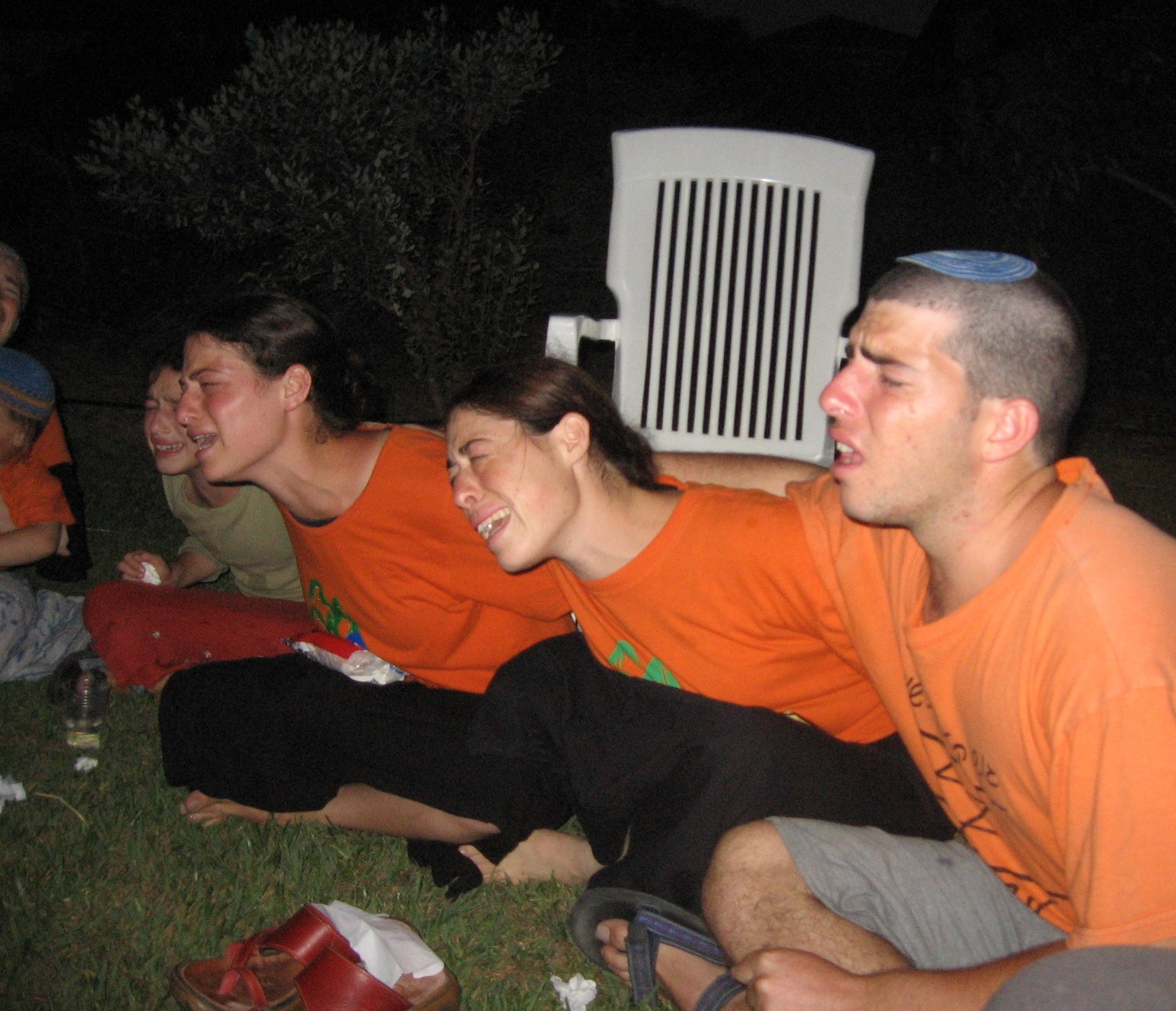
On
the eve of expulsion from Neve Dekalim: the tears
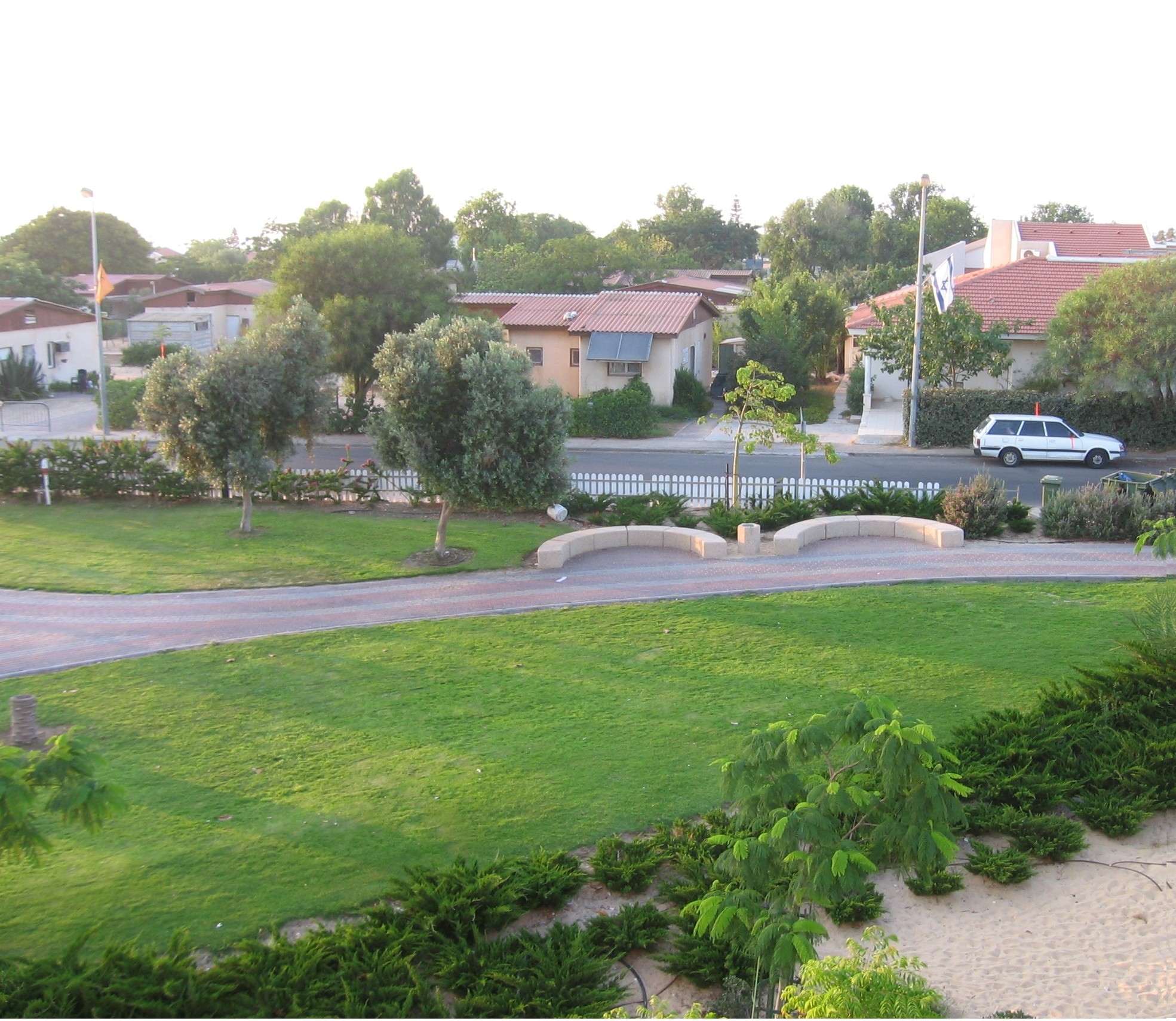
Neve Dekalim – Paradise Lost
Chapter 17:
The
Disconnection of the State of Israel from the Jewish People
Earlier we asked if the State of
Israel was established in order to grant the nation of Israel the
unprecedented “privilege” of having a legitimate representative to renounce
its right to the Land of Israel in favor of the PLO or Hamas.
The time has come to return to this
question and to answer it seriously and without irony: The State of Israel
is NOT the legitimate representative of the Jewish people to
surrender the Land of Israel to foreigners. It has no authority to do so on
behalf of the Jewish people living today in Israel and in the Diaspora, or
on behalf of all the generations past and future. Decisions to retreat,
abandon, flee, concede, expel, and uproot cannot obligate the individual Jew
or the entirety of the Jewish people, just as the apostasy of some rabbis
and community leaders following the persecution of the Jews in Spain, or the
conversion to Islam of the false messiah Shabtai Zvi, did not and could not
obligate the Jewish people.
Governmental decisions to turn the Land
of Israel into Palestine can obligate, at most, the executive bodies of the
state such as the military, the civil administration, the police, and the
civil bureaucracy, to make administrative changes. However, those decisions
cannot touch the deep-rooted connections to the Land of Israel. A government
administration and a Knesset can exile themselves from the heart of the Land
of Israel – and with them the legal and judicial framework called a state –
but only at the price of nullifying their right to speak in the name of the
Jewish nation, and of canceling the “power of attorney” that that government
assumed in the name of the Jewish people.
“Who appointed you?,” the Jews asked
Herzl when he presumed to negotiate with kings and heads of state “in the
name of the Jewish nation”. By way of answer, Herzl claimed “negotiorum
gestio”, a Roman legal concept that states that he, who comes to the
rescue when the homeowner is absent, is permitted to act without obtaining
formal consent. He who comes to extinguish a fire is permitted by law to
break into the house without asking questions. Sadly, a State of Israel that disclaims
the power to hold on to the nation’s heartland abdicates its right of
negotiorum gestio, Herzl’s legacy. From that time on, the state would be
nothing more than another Jewish society on the fringes of the historic Land
of Israel.
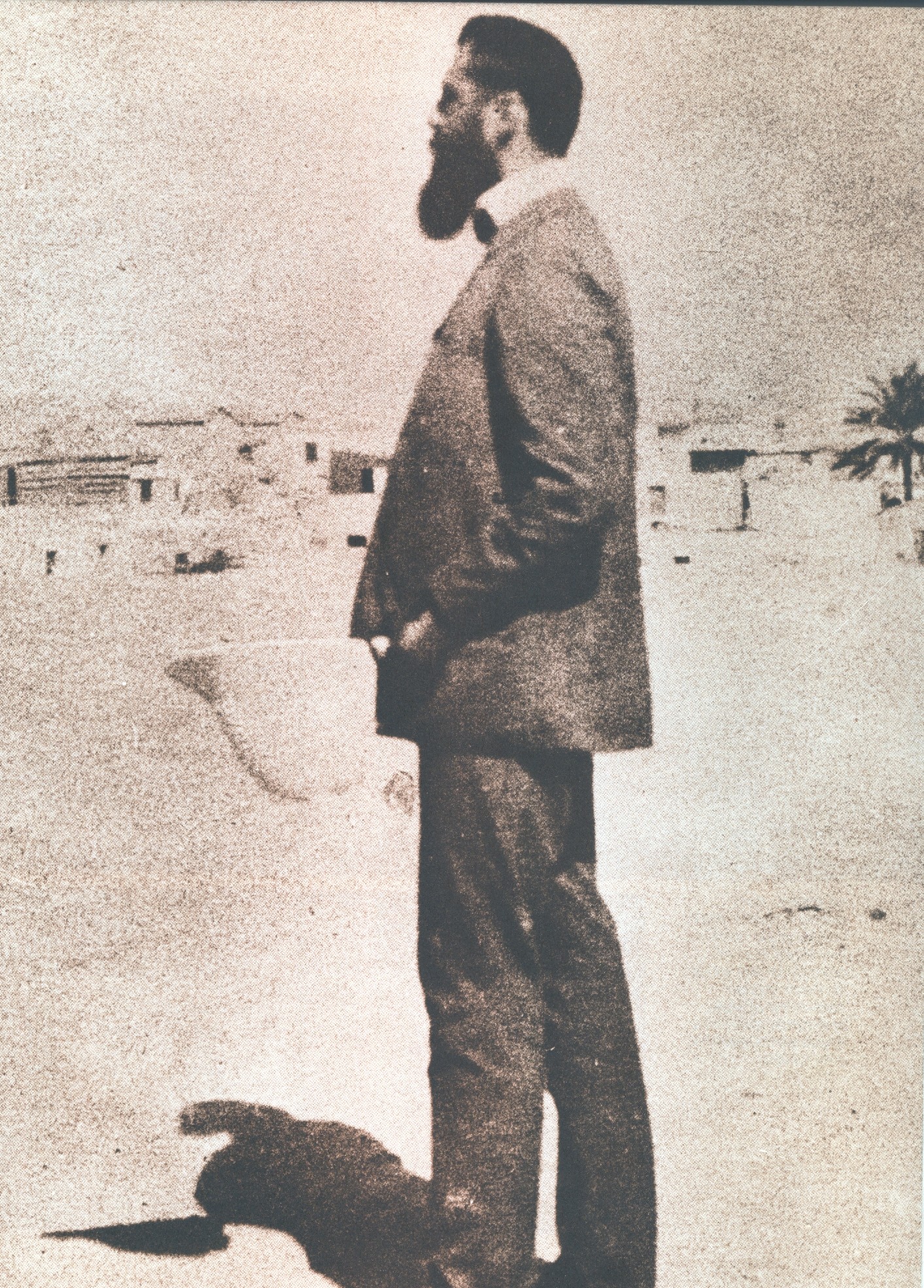
An unwritten power-of-attorney
Chapter 18:
Back to Rabbi
Nachman
Earlier we quoted from Rebbe Nachman’s
poetic longing for the Land of Israel. Here we bring his normative
formulation of the eternal legal connection to the Land of Israel that no
errant government – even if it is the government of Israel – can sever:
Even though they stole
from us the Land of Israel
which is our land and our inheritance
And even though we lack the power to take it back from them due to the
flaws of our deeds,
nonetheless we pray and we shout to Heaven always ---
that the Land of Israel is ours,
because it is our inheritance,
and in so doing we protest against the Adversary,
so they know that their possession is no possession at all.
The Land of Israel is ours from our Fathers,
and in the end we will take it back from out of their hands, with God’s
help...
I refer to the physical, literal Land of Israel
with its houses and courtyards...
The matter of “protest” requires
explanation. According to Jewish law, an owner of real estate loses his
legal claim against squatters if he allows a number of years to pass without
“protesting”.
The remembrance of Zion and Jerusalem
by the Jewish people by “praying and shouting” 365 days a year is not just
prayer, but also a legal act which prevents the statute of limitations from
running out on our legal claim to the land during our absence from it. Indeed,
from the day we were exiled from our land to the day these lines are being
written, the nation of Israel hasn’t stopped “protesting” even one day.
Not in his worst nightmare could Rebbe
Nachman have imagined that a Jewish sovereign government in Zion would
willfully “steal from us” the Land of Israel to give it to another people.
Rebbe Nachman wrote about foreigners “stealing from us”. The possibility of
voluntarily surrendering the land obviously never occurred to him, because
once our rights are voluntarily abdicated, any further “protest” would be to
no avail. Unless, that is, the people “shout” and insist that the abdicator,
even if it be the Jewish government of the State of Israel, has no right or
authority to execute such a historic crime, and there arises among us a
Jewish De Gaulle who will declare
the surrender null and void and act accordingly.
We believe that the prayers and shouts
of Rebbe Nachman still echo in the ears of many in Israel and that his
“protest” pulses in their blood – whether in religious or secular form.
These Jews will feel themselves obligated to grab this White Paper of
surrender and tear it to pieces.
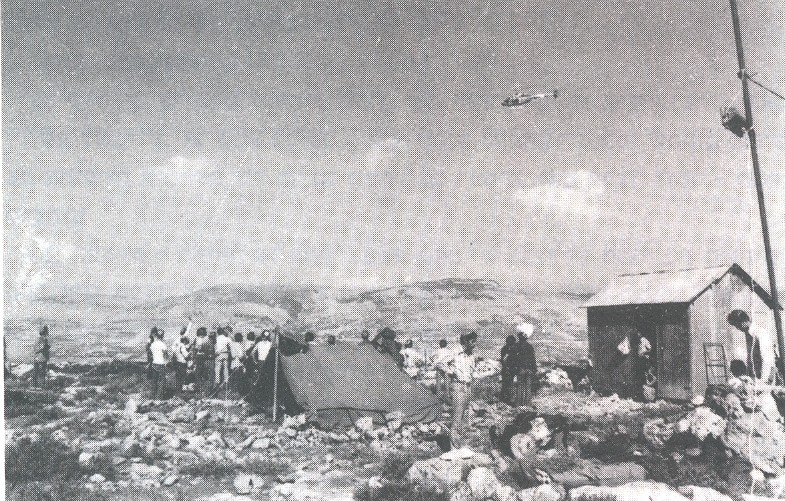
The ascent to Elon Moreh
Chapter 19:
Jews in the
Surrendered Territories
Let us consider the highly improbable,
purely theoretical, but nevertheless intriguing supposition that after the
state withdraws the army, police, and civil administration from Judea and
Samaria, hundreds of thousands of Jews remain in these territories. They
might likely be joined by others from Israel and the Diaspora who will pour
in as an “emergency call-up” to save the land. As we have seen, these Jews
will consider themselves completely exempt from and unbound by the
governmental abdication. They will no longer maintain an attachment to the
state that turned its back on the land and on them.
On the one hand, should the state again
try to drag tens of thousands of Jews out of their homes by force, this time
spilling blood in the process, widespread rebellion against the state is
possible. The after-shock of the first expulsion from Gush Katif and the
barbarity in Amona are making their influence felt already in society and in
the army. We are not referring only to the deportees and their supporters.
Also in the hearts of the perpetrators of the crime and their families,
fierce inner conflicts are to be expected. The whole process will bring the
state to the edge of the abyss. Even in the most optimistic scenario, after
such an earthquake, nothing in Israel will be the same.
On the other hand, if Jews succeed in
remaining in Judea and Samaria after having refused a third exile, they will
have no choice but to create a new existence and experience a new reality:
Jews (will they still be citizens of the State of Israel?) living in the
Land of Israel outside the State of Israel.
How long will these Jews be cut off
from the state before the army will be forced to return to prevent a “Super
Sabra and Shatilla” or to stop the rain of rockets that will transform life
in the coastal cities into a hell? How long will the Israeli “Vichy
government” maintain power in post-retreat Israel? How will the Jewish
communities of the Diaspora relate to that Israel?
What will be the relationship of the
Jewish entity in Judea and Samaria with the state on the one hand and the
Jewish Diaspora on the other? Will the State of Israel and Judea-Samaria
compete for the hearts (and money) of the Jews of the Diaspora? Will a new
Jewish culture develop in Judea and Samaria? Will there be separate courts
that will make separate and conflicting rulings, like the French courts that
judged, each in its time, De Gaulle and Petain?
Will the two separate entities continue
to wage the same cultural war that is raging even today among the people of
Israel on both sides of the Green Line? Here, a Zionist state in its simple
meaning of the return of the people of Israel to Zion, and there, a
secular-democratic state who relinquishes Zion to the Arabs? Will the Jewish
masses in the State of post-retreat Israel allow the decline of the Zionist
ideal to continue unchecked or will we perhaps witness a reaction in the
form of a repentance movement or a national soul searching, a re-Zionization
instead of a de-Zionization?
These are questions that, whoever knows
how to, should pray that they never need be answered.
Chapter 20:
Rehoboam the Second
The Prime Minister of Israel is facing
the fateful choice faced 3,000 years ago by Rehoboam, the son of King
Solomon.
Rehoboam inherited a united kingdom.
Cautious advisors, the “elders”, pleaded with him not to pull the leash too
tightly because he lacked wide popular consensus. However, inexperienced and
arrogant counselors, “the children”, goaded him to apply all his muscle: “my
father flogged you with whips, but I will flog you with scorpions.” Those
words led directly to the division of the nation into the kingdoms of Judea
and Israel.
Will a second Rehoboam arise today?
Will all the basic covenants uniting us – social, political, cultural, and
religious – be violated? In our day too will the people and the kingdom
split?
If so, even the truncated state that
will remain after all the “disengagements” and “convergences” will be far
from idyllic. A post-retreat government will have to contend with a severe
spiritual estrangement even on the part of those segments of society who
were passive throughout the upheavals and took no part in events. Many will
leave the country, whether out of protest, out of despair, or out of a lack
of identity with a state castrated of every ideal and all striving. The
emigrants will abandon a country threatened in its caricature borders,
subservient to the US State Department, and reduced to the status of a
protectorate under a board of supervisors of the Quartet – in short, a state
in name only, stripped of its last shred of honor.
But even the ones who stay, whether for
lack of opportunity to emigrate or because of their natural and unshakable
sense of belonging to their homeland, will be an embittered and divided
public. Many will develop guilt syndromes that will dwarf the scars left by
the Yom Kippur War. Also, the division of the nation will not end with a
truncated state. It will become clear very quickly that the fate of the land
remains undecided, with the Arabs always returning with additional demands.
The internal fractures will continue and even worsen; they will be replete
with bitter recriminations.
Moreover, the physical danger to the
dismembered state will be intensified even beyond what could be expected of
such compromised borders (Jerusalem, Afula, Netanya, Hadera, Ben Gurion
Airport, Petach Tikva, Kiryat Gat, Beersheva, Ein Gedi – all of them border
towns!). The principle security threat will arise from the divided state of
the nation, from the internal destruction that will severely impact the IDF.
Rehoboam
the Second will quickly discover the depth of his error, in trading peace
between Jews for “peace” with the Arabs, and war with the Arabs for war
against Jews. Not only because “peace with the Arabs” is an illusion and a
death trap, but because there is simply no equivalence and symmetry between
the two alternatives. One can win a war against an enemy, but in a civil
war, even without massive violence, there are no winners. Both sides lose;
both are vanquished.
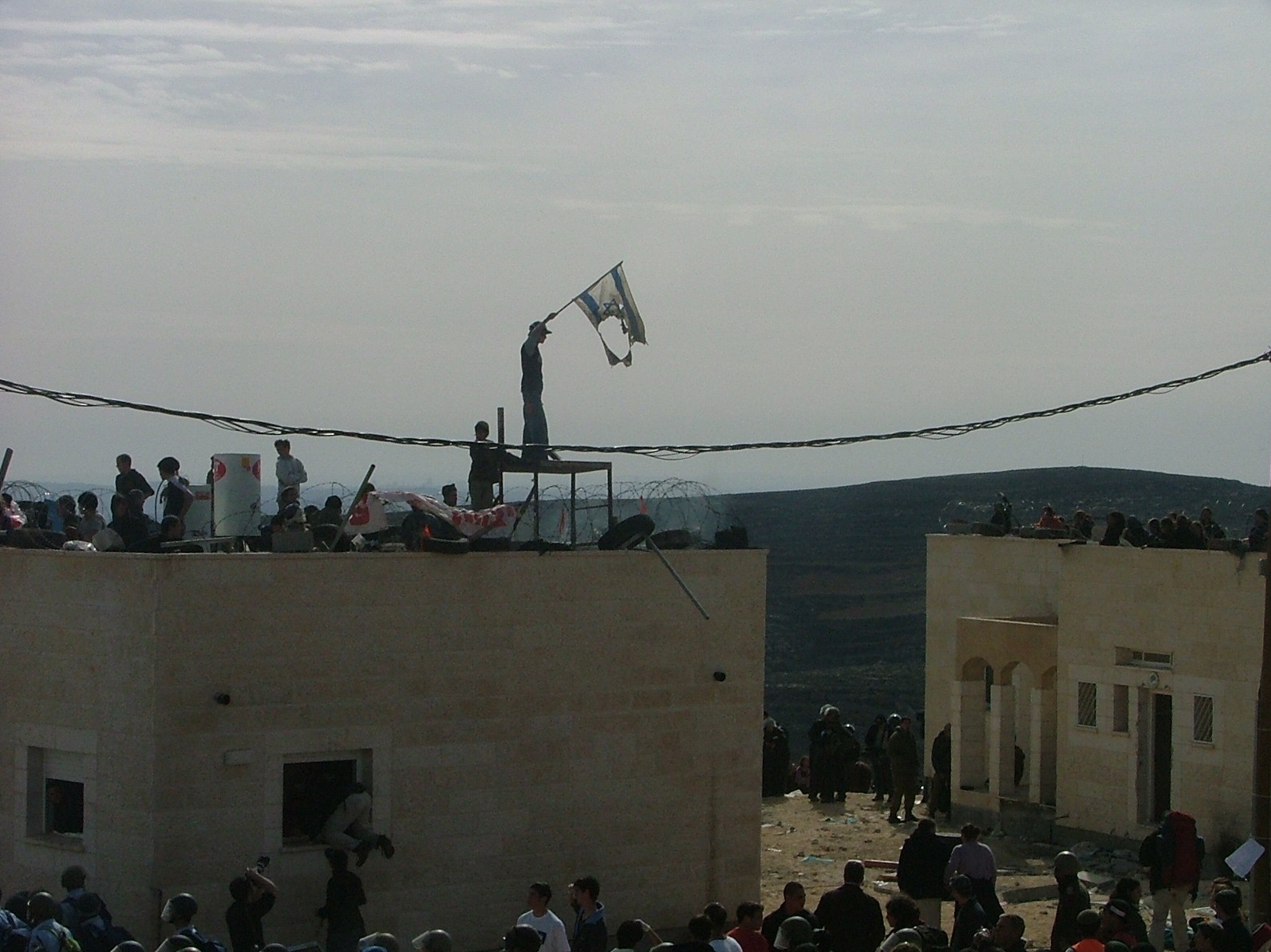
Amona: the flag is burned
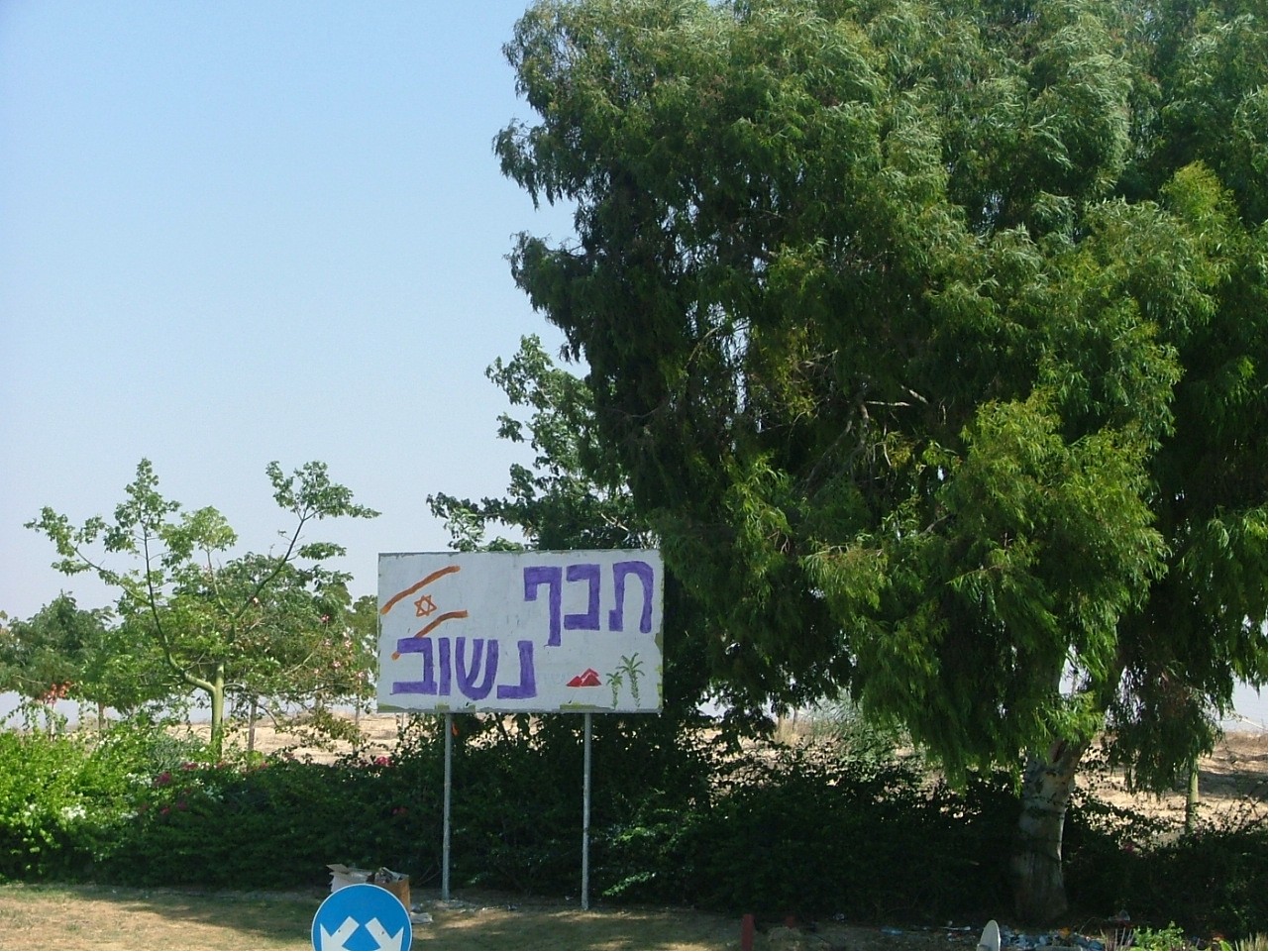
Katif Junction (the Hebrew sign reads: “Be
Back Soon”)
Chapter 21:
Fifty Years of
Hindsight Later
A school in Jerusalem, the capital of
Greater Palestine, prepares for the 50th
anniversary of the liberation of the Palestinian homeland from the Zionist
occupation.
Teacher: What were the
historic roles of Zionism and the occupation?
Student: Originally we
thought we were part of the Arab nation of Southern Syria, until the
opposition to Zionism consolidated our identity and aroused in us a national
consciousness as a separate nation, even with a unique history, thousands of
years old, as we learned from the Jews.
Teacher: And what was the
historic role of the conquest of the West Bank by the Zionist army back in
1967?
Student: The Zionist army
liberated the Palestinian nation from the yoke of the Jordanian occupation,
which never, ever would have allowed a Palestinian sovereign entity to
arise. The occupation authorities of the Jews built for us the physical,
educational, and political infrastructure for independence.
With the
Oslo Accords, they gave us the means and the territory to conduct two wars
of independence, at the end of which the Zionist general Sharon surrendered
and fulfilled our dream of a Palestinian state.
Zionism
made us into a people; the occupation gave us a state.
* * *
One hundred and fifty-four years
earlier, the prophet of the State of the Jews prefaced his book Old-New
Land by saying that “if you will it, it’s not a dream.” In the book’s
epilogue, however, he added a less famous message:
...and if you do not will it, then all
that I told to you is a fairy tale...dream and deed – they are not as
different from one another as people are inclined to think. Because all the
deeds of men are founded on dreams and return to dreams.
The founding generations willed it, and
the dream became reality. If the inheriting generations will not will it,
the reality will return to being a dream.
But even Herzl did not foresee the
nightmare of a Jewish state transformed into an Arab-Palestinian state.
Chapter 22:
An Idol
in the Temple – Civil Disobedience in Ancient Judea
The earliest known case of mass civil
disobedience is described by Prof. Joseph Klausner in his article “The First
Pogrom and the Idol in the Sanctuary – When a Nation Fights For Its Freedom”
(Political Editions, Tel Aviv, 1936):
The Roman Caesar Caligula promulgated
an edict to erect his statue in the Holy Temple in Jerusalem, where the eyes
of all Jews are eternally fixed. It fell to Petronius, recently appointed
procurator of Syria, to fulfill the edict. Caligula ordered Petronius to
take with him half the Roman army camped on the Euphrates to suppress any
opposition to the statue’s installation.
News of the edict reached the Land of
Israel and caused terrible agitation and anguish amongst the Jews. Many
refused to believe the bad news, but were quickly forced to admit the worst.
At the end of that winter, in the year 40 A.C.E, Petronius and his army
arrived in Acre. Phoenician artists had already crafted the statue in Sidon.
The news spread with lightning speed in
Judea, and the nation was struck with fear and trembling. Not just the elite
or the scholars, but the entire nation.
Apparently there were individuals who
conducted an intensive campaign to arouse the people against the desecration
during the months between the end of the winter and the start of the
harvest. At harvest time, Jews from towns and villages by the tens of
thousands started streaming towards the plain of Acre, until a great mass of
people gathered before Petronius and his stunned army. “Like a cloud, the
masses of Jews covered the whole land of Phoenicia,” Philo relates.
Before long, a terrible wailing broke
out from among the sea of Jews and shocked the Roman noble, Petronius. The
great mass – organized in six groups, old men, men, and boys on one side,
and old women, women, and girls on the other side – fell on their faces and
begged for mercy for the Temple:
We have not come to fight, but there are
only two possibilities: Either you do not erect the statue or you kill the
whole Jewish nation to the last person. Behold, our necks are stretched out
towards the executioners. Only when not one of us is left alive will you
fulfill the decree of the Emperor Caligula.
The heart of the Roman was stirred. His
armies possessed tens of thousands of swords while there was nothing in
Jewish hands. Nonetheless, he felt powerless in the face of the tremendous
power demonstrated by this mass. Great was the moment when Petronius, one of
the better Romans, withdrew together with his mighty legions before this
people, who were risking their lives and those of their loved ones to
sanctify God’s name.
To buy time, he moved his servants and
advisors to Tiberius, but when the Jews found out, they all picked up and
moved to Tiberius, spreading their enormous camp before the city. By now, it
was the time for sowing, but the Jews neglected their fields. For forty days
they camped outside the city, beseeching Petronius to annul the evil decree.
Petronius knew that Caligula would never forgive a procurator that would
dare to refuse his command. But the self-sacrifice of the Jews, whose like
he had never seen nor heard of, moved him greatly. He was held by an inner
compulsion to risk his life for their sake. He promised to try to avert the
evil decree and wrote to the Caesar asking to postpone the statue’s
erection. The request aroused the fury of Caligula, who answered him with a
missive accusing him of bribery by the Jews and ordering him to kill himself
as punishment.
Petronius’ life was saved only because
the ship that carried news of Caligula’s murder arrived before the ship that
carried Caligula’s decree against Petronius, which was delayed by a storm.

Settlement in the Land of Benjamin
Epilogue
In our day, the decree that Ehud Olmert
and his camp seek to impose on Israel does not come from a foreign ruler, and
death does not threaten those who oppose it. Like in Petronius’ day, it would
only take tens of thousands to annul today’s evil decree, on the condition
that they stand firm and not be deterred by prison and detention camps.
Let us hope that the people of Israel
arouse themselves again as they did during the time of Caligula. These
latter-day dissenters would add a noble chapter to world history by
contributing once again to the universalist tradition of fighters for freedom
and human rights from Socrates to Martin Luther King. More importantly, they
would add an honored chapter to Jewish history by following in the footsteps
of their fathers who sanctified God’s name before the Roman Caesar in the Land
of Israel.
|
* |
It
must be noted that in the recent decisions of the Supreme Court there has
been a marked change in direction, as the motif of “occupation” is
stressed more and more in accordance with the leftward drift in the
government’s policy. |
The booklet form of this paper was
published in cooperation with the Gamla organization.

|



















